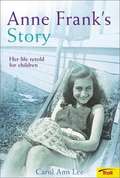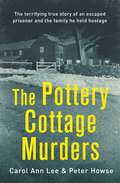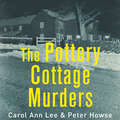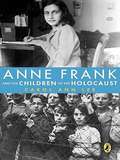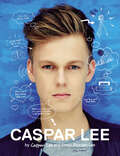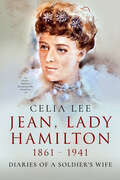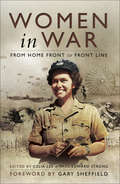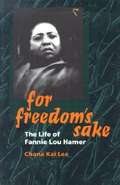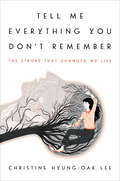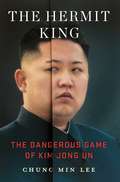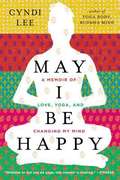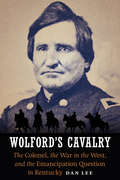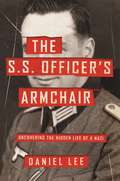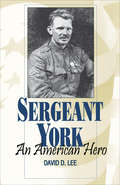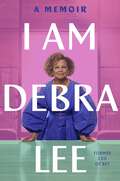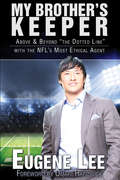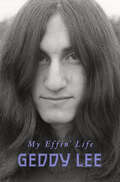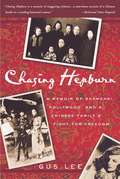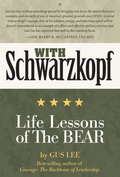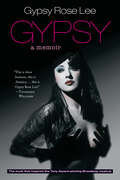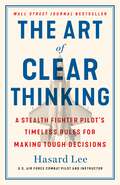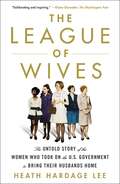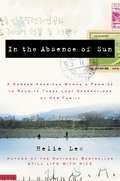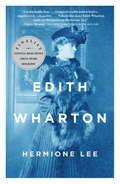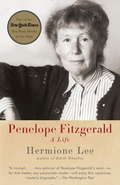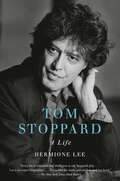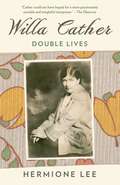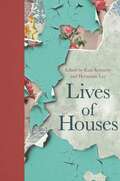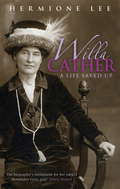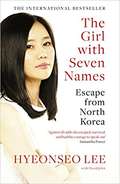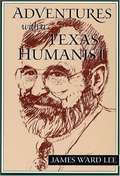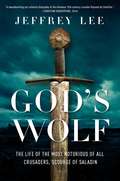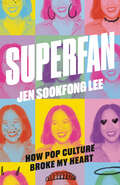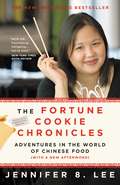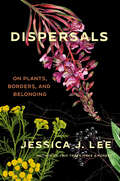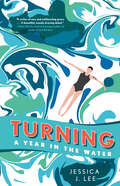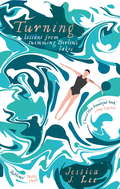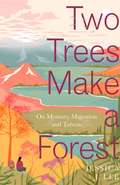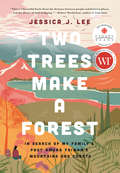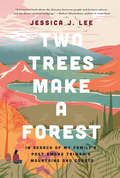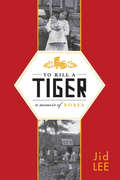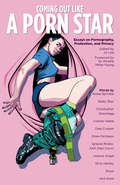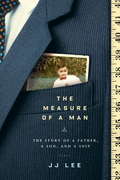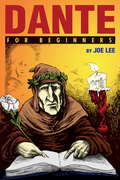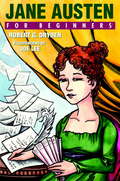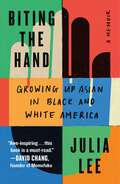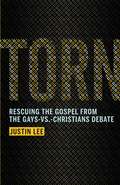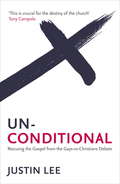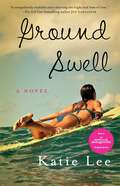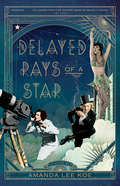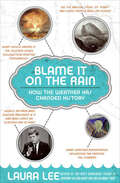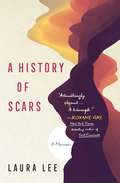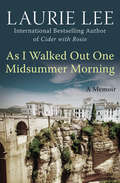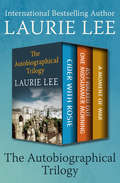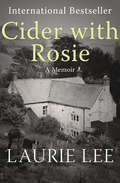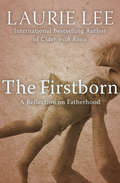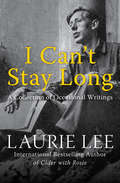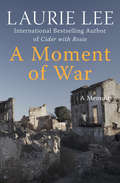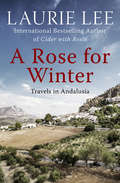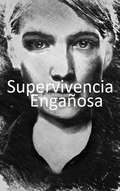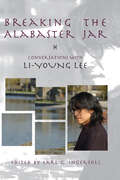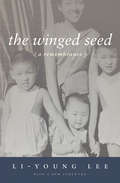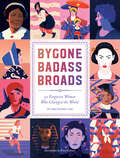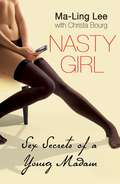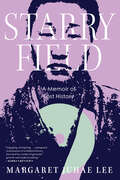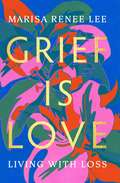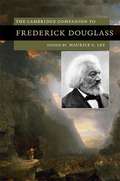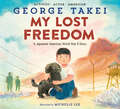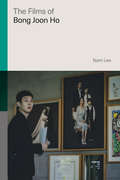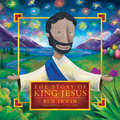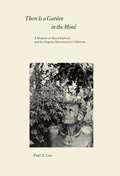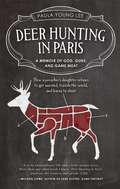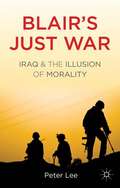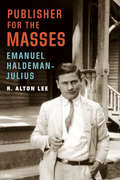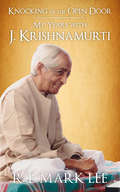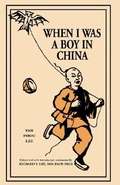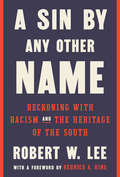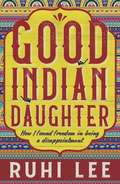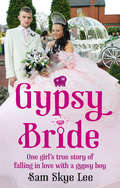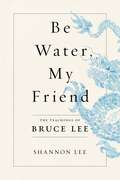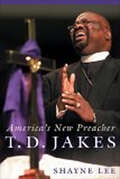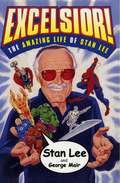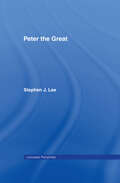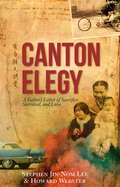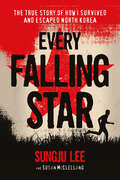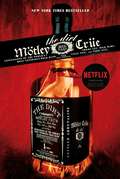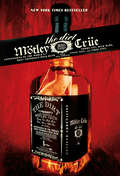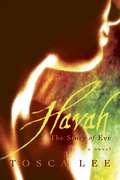- Table View
- List View
Anne Frank's Story: Her Life Retold for Children
by Carol Ann LeeExpands on the story of Anne Frank revealed in her diary by providing details about the family and friends who shaped her life and gave her the strength to endure two years of hiding in an attic in Nazi-occupied Holland.
The Pottery Cottage Murders: The terrifying true story of an escaped prisoner and the family he held hostage
by Carol Ann Lee Peter HowseA psychopathic criminal on the run from prison. A family of five held hostage in their home. A frantic police manhunt across the snowbound Derbyshire moors. Just one survivor.The definitive account of the terrifying 1977 Pottery Cottage murders that shocked Britain. For three days, escaped prisoner Billy Hughes played macabre psychological games with Gill Moran and her family, keeping them in separate rooms of their home while secretly murdering them one by one. On several occasions Hughes ordered Gill and her husband Richard to leave the house for provisions, confident that they would return without betraying him in order to protect their loved ones.Blizzards hampered the desperate police search, but they learned where the dangerous convict was hiding and closed in on the cottage. A high-speed car chase on icy roads ended with a crash and the killer being shot as he swung a newly sharpened axe at his final victim. This was Britain's first instance of police officers committing 'justifiable homicide' against an escapee. The story of these terrible events is told here by Carol Ann Lee and Peter Howse, the former chief inspector who saved Gill Moran's life over forty years ago.Peter's professional role has permitted access to witness statements, crime scene photographs and police reports. Peter Howse and Carol Ann Lee have made use of these, along with fresh interviews with many of those directly involved, to tell a fast-paced and truly shocking story with great insight and empathy.
The Pottery Cottage Murders: The terrifying true story of an escaped prisoner and the family he held hostage
by Carol Ann Lee Peter HowseA psychopathic criminal on the run from prison. A family of five held hostage in their home. A frantic police manhunt across the snowbound Derbyshire moors. Just one survivor.The definitive account of the terrifying 1977 Pottery Cottage murders that shocked Britain. For three days, escaped prisoner Billy Hughes played macabre psychological games with Gill Moran and her family, keeping them in separate rooms of their home while secretly murdering them one by one. On several occasions Hughes ordered Gill and her husband Richard to leave the house for provisions, confident that they would return without betraying him in order to protect their loved ones.Blizzards hampered the desperate police search, but they learned where the dangerous convict was hiding and closed in on the cottage. A high-speed car chase on icy roads ended with a crash and the killer being shot as he swung a newly sharpened axe at his final victim. This was Britain's first instance of police officers committing 'justifiable homicide' against an escapee. The story of these terrible events is told here by Carol Ann Lee and Peter Howse, the former chief inspector who saved Gill Moran's life over forty years ago.Peter's professional role has permitted access to witness statements, crime scene photographs and police reports. Peter Howse and Carol Ann Lee have made use of these, along with fresh interviews with many of those directly involved, to tell a fast-paced and truly shocking story with great insight and empathy.
The Pottery Cottage Murders: The terrifying true story of an escaped prisoner and the family he held hostage
by Carol Ann Lee Peter HowseIncludes an exclusive interview with Peter Howse and Carol Ann LeeA psychopathic criminal on the run from prison. A family of five held hostage in their home. A frantic police manhunt across the snowbound Derbyshire moors. Just one survivor.The definitive account of the terrifying 1977 Pottery Cottage murders that shocked Britain. For three days, escaped prisoner Billy Hughes played macabre psychological games with Gill Moran and her family, keeping them in separate rooms of their home while secretly murdering them one by one. On several occasions Hughes ordered Gill and her husband Richard to leave the house for provisions, confident that they would return without betraying him in order to protect their loved ones.Blizzards hampered the desperate police search, but they learned where the dangerous convict was hiding and closed in on the cottage. A high-speed car chase on icy roads ended with a crash and the killer being shot as he swung a newly sharpened axe at his final victim. This was Britain's first instance of police officers committing 'justifiable homicide' against an escapee. The story of these terrible events is told here by Carol Ann Lee and Peter Howse, the former chief inspector who saved Gill Moran's life over forty years ago.Peter's professional role has permitted access to witness statements, crime scene photographs and police reports. Peter Howse and Carol Ann Lee have made use of these, along with fresh interviews with many of those directly involved, to tell a fast-paced and truly shocking story with great insight and empathy.
Anne Frank and the Children of the Holocaust
by Carol Anne LeeAnne Frank's diary changed how the world saw the Holocaust? this book will change how you see Anne Frank. Beginning with Otto Frank's idyllic childhood, follow the family's journey from its proud German roots through life under Nazi occupation to their horrifying concentration camp experiences. Interspersed with their story are personal accounts of survivors, excerpts from the other victims? journals, and black-and-white photos. A perfect blend of historical information and emotional narratives, this book makes an excellent companion to the diary, offering an in-depth look at the life of Anne Frank, and an intimate history of the young people who experienced the Holocaust. .
Caspar Lee
by Caspar LeeA hilarious biography from YouTube sensation Caspar Lee (and his mom)! This is a book about me. Unfortunately, I didn't write it--my mom did. WTF!Let me tell you now that 98% of it is total lies. Actually, I'm pretty sure this book is illegal. So if you've bought it, you've basically supported a criminal. How does that feel?I think she's getting me back for my first day in this world when I may have tried to kill her. She won't not be able to mention that. You might also find out about my first day at school, why my head is so massive, how I've always been a hit with the ladies and other things like that.You know, important stuff. Anyway, I found the book at the printer and you'll see I've corrected some of her most outrageous lies.So, you know, enjoy. Just remember only the bits that make me look good are true . . .
Jean, Lady Hamilton, 1861–1941: Diaries of A Soldier's Wife
by Celia Lee“A pleasure to read. It’s predominantly about the life of Jean Hamilton’s husband Ian as an officer during the Great War and life for both before and after.” —UK HistorianJean, Lady Hamilton’s diaries remained forgotten and hidden in the Liddell Hart Centre for Military Archives, King’s College, London, for fifty years. The story begins with the young couples’ wedding, a dazzling bride, Jean Muir, marrying a star-struck Major Ian Hamilton. The daughter of the millionaire businessman Sir John Muir, Jean had all the money whilst Hamilton was penniless.Having spent their early married years in India, the Hamiltons returned and set up house in the prestigious Hyde Park area of London, also eventually buying Lullenden Manor, East Grinstead, that they purchased as a country home from Winston Churchill when he could no longer afford it. Churchill in particular was like family in the Hamiltons’ home; he used to go there and practice his speeches, and painted alongside Jean to whom he sold his first painting.Jean chronicled Ian’s long army career that culminated in the Gallipoli campaign in 1915. The failure there ended her husband’s distinguished career and almost ended Churchill’s as he had to leave his job as First Lord of the Admiralty. This account is Lady Hamilton’s “attempt to chronicle her husband’s life as a top-flight but penniless soldier, this at a time when young Winston Churchill . . . was emerging from his own distinguished and very colourful military career to enter a life of politics . . . Jean Hamilton is one of those larger than life people of whom we know very little until a book such as Celia’s comes along” (Books Monthly).
Women in War: From Home Front to Front Line
by Celia Lee Paul StrongThe changing role of women in warfare, a neglected aspect of military history, is the subject of this collection of perceptive, thought-provoking essays. By looking at the wide range of ways in which women have become involved in all the aspects of war, the authors open up this fascinating topic to wider understanding and debate. The discuss how, particularly in the two world wars, women have been increasingly mobilized in all the armed services, originally as support staff, then in defensive combat roles. They also consider the tragic story of women as victims of male violence, and how women have often put up a heroic resistance, and examine how women have been drawn into direct combat roles on an unprecedented level, a trend that is still controversial in the present day. The collection brings together the work of noted academics and historians with the wartime experiences of women who have remarkable personal stories to tell. The book will be a milestone in the study of the recent history of the parts women have played in the history of warfare.AuthorsDr Juliette Pattinson, Professor Mark Connelly, Georgina Natzio, Christine Halsall, Jonathan Walker, Major Imogen Corrigan, Dr. Halik Kochanski, Dr T.A. Heathcote, Elspeth Johnstone, Mike Ryan, Grace Filby, Dr George Bailey, Tatiana Roshupkina, Leicester Chilton, Paul Edward Strong, Celia Lee, John Lee
For Freedom's Sake: The Life of Fannie Lou Hamer
by Chana Kai LeeA biography of Fannie Lou Hamer, one of the most important civil rights activists of the 20th century. It documents Hamer's lifelong crusade to empower the poor through collective action and the personal costs of her struggle to win a political voice and economic self-sufficiency for blacks in the segregated South.
Tell Me Everything You Don't Remember: The Stroke That Changed My Life
by Christine Hyung-Oak Lee“A brave, encouraging, genuine work of healing discovery that shows us the ordinary, daily effort it takes to make a shattered self cohere.” — Floyd Skloot, author of In the Shadow of Memory“The stuff of poetry and of nightmares… [Lee] investigates her broken brain with the help of a journal, beautifully capturing the helplessness, frustration, and comic absurdity (yes, a book about a stroke can be funny!) of navigating life after your world has been torn apart.” — Susannah Cahalan, author of Brain on Fire“Lee excavates her life with the care of an archeologist in this stunning memoir...Her account is lyrical, honest, darkly comic, surprising, and transcendent in the way it redefines the importance of family history, memory, and what of it we choose to hold with us. A beautiful book.” — Christa Parravani, author of Her: A Memoir“A searing memoir buoyed by hope.” — People“This honest and meditative memoir is the story about how Hyung-Oak Lee rebuilt her life, quite literally one step at a time, and how she discovered the person she had always wanted to become.” — Refinery29.com“Honest and insightful” — New York Times Book Review“Emotionally explicit and intensely circumspect... . With careful thought and new understanding, the author explores the enduring mind-body connection with herself at the nexus of it all. A fascinating exploration of personal identity from a writer whose body is, thankfully, ‘no longer at war.’” — Kirkus Reviews“Fearless... [Lee’s] engaging memoir...makes a difficult topic accessible and relatable. Lee expertly explains how the brain works and how even a damaged brain can adapt. Her narrative is both scientific and emotional, revealing the wonders of biology and the power of the human spirit.” — Booklist
The Hermit King: The Dangerous Game of Kim Jong Un
by Chung Min LeeNorth Korea is poised at the crossroads of history. Which direction will its leader take?Throughout the world, oppressive regimes are being uprooted and replaced by budding democracies, but one exception remains: The People's Republic of North Korea. The Kim family has clung to power for three generations by silencing dissidents, ruling with an iron fist, and holding its neighbors hostage with threats of war. Under the leadership of Kim Jong Un, North Korea has come closer than ever to creating a viable nuclear arsenal, but widespread famine and growing resistance are weakening his regime's stability.In The Hermit King, Asian geopolitical expert Chung Min Lee tells the story of the rise of the Kim Dynasty and its atrocities, motivations, and diplomatic goals. He also discusses the possible outcomes of its aggressive standoff with the world superpowers.Kim Jong Un is not a crazed "Rocket Man" or a bumbling despot; he has been groomed since birth to take control of his country and stay in power at all costs. He is now at a fateful crossroads. Will he make good on decades of threats, liberalize North Korea and gain international legitimacy, or watch his regime crumble around him? Lee analyzes the likelihood and consequences of each of these possibilities, cautioning that in the end, a humanitarian crisis in the region is all but unavoidable. The Hermit King is a thoughtful and compelling look at the most complicated diplomatic situation on Earth.
May I Be Happy
by Cyndi Lee"For the millions of people--especially women--who fight the fat talk in their heads, her words will be familiar and comforting." --Associated Press In the opening pages of her memoir, Cyndi Lee shares a surprising revelation. Despite her success as a dancer, choreographer, and yoga teacher, she was caught in a lifelong cycle of self-judgment about her body. Inspired by her students, Lee embarked on a journey of self-discovery--around the globe and within herself--and sought the counsel of knowing women, including Jamie Lee Curtis, Dr. Christiane Northrup, and Louise Hay. Applying the ancient Buddhist practice of loving-kindness meditation, Lee comes to learn that compassion is the only antidote to hate. By becoming her own best student, Lee internalizes the strength, stability, and clarity she seeks to impart.
Wolford's Cavalry: The Colonel, the War in the West, and the Emancipation Question in Kentucky
by Dan LeeColonel Frank Wolford, the acclaimed Civil War colonel of the First Kentucky Volunteer Cavalry, is remembered today primarily for his unenviable reputation. Despite his stellar service record and widespread fame, Wolford ruined his reputation and his career over the question of emancipation and the enlistment of African Americans in the army. Unhappy with Abraham Lincoln’s public stance on slavery, Wolford rebelled and made a series of treasonous speeches against the president. Dishonorably discharged and arrested three times, Wolford, on the brink of being exiled beyond federal lines into the Confederacy, was taken in irons to Washington DC to meet with Lincoln. Lincoln spared Wolford, however, and the disgraced colonel returned to Kentucky, where he was admired for his war record and rewarded politically for his racially based rebellion against Lincoln. Although his military record established him as one of the most vigorous, courageous, and original commanders in the cavalry, Wolford’s later reputation suffered. Dan Lee restores balance to the story of a crude, complicated, but talented man and the unconventional regiment he led in the fight to save the Union. Placing Wolford in the context of the political and cultural crosscurrents that tore at Kentucky during the war, Lee fills out the historical picture of “Old Roman Nose.”
The S.S. Officer's Armchair: Uncovering the Hidden Life of a Nazi
by Daniel LeeBased on documents discovered concealed within a simple chair for seventy years, this gripping investigation into the life of a single S.S. officer during World War Two encapsulates the tragic experience of a generation of EuropeansOne night at a dinner party in Florence, historian Daniel Lee was told about a remarkable discovery. An upholsterer in Amsterdam had found a bundle of swastika-covered documents inside the cushion of an armchair he was repairing. They belonged to Dr. Robert Griesinger, a lawyer from Stuttgart, who joined the S.S. and worked at the Reich's Ministry of Economics and Labor in Nazi-occupied Prague during the war. An expert in the history of the Holocaust, Lee was fascinated to know more about this man--and how his most precious documents ended up hidden inside a chair, hundreds of miles from Prague and Stuttgart.In The S.S. Officer's Armchair, Lee weaves detection with biography to tell an astonishing narrative of ambition and intimacy in the Third Reich. He uncovers Griesinger's American back-story--his father was born in New Orleans and the family had ties to the plantations and music halls of nineteenth century Louisiana. As Lee follows the footsteps of a rank and file Nazi official seventy years later, and chronicles what became of him and his family at the war's end, Griesinger's role in Nazi crimes comes into focus. When Lee stumbles on an unforeseen connection between Griesinger and the murder of his own relatives in the Holocaust, he must grapple with potent questions about blame, manipulation, and responsibility.The S.S. Officer's Armchair is an enthralling detective story and a reconsideration of daily life in the Third Reich. It provides a window into the lives of Hitler's millions of nameless followers and into the mechanisms through which ordinary people enacted history's most extraordinary atrocity.
Sergeant York: An American Hero
by David D. LeeAlvin C. York went out on a routine patrol an ordinary, unknown American doughboy of the First World War. He came back from no-man's-land a hero. In a brief encounter on October 8, 1918, during the Argonne offensive, York had killed 25 German soldiers and, almost singlehandedly, effected the capture of 132 others. Returning to the United States the following spring, he received a tumultuous public welcome and a flood of offers from businessmen eager to capitalize on his acclaimed feat. But York, true to his character, went quietly back to his home in the Tennessee mountains, where he spent the remainder of his life working to bring schools and other services to those remote valleys where his neighbors lived.In this definitive biography, David D. Lee has firmly established the simple facts of Alvin York's life, distinguishing them from the myths which have grown up around the man. He has reexamined the sometimes conflicting accounts of the famous exploit, finding in his research a hitherto unknown report of the skirmish from German military archives. Lee goes beyond that single wartime episode, however, to consider its consequences on York's later life -- his efforts, not always successful, to better his mountain community; his involvement in making a motion picture of his life; his difficulties with money and taxes. But Sergeant York is better known as a symbol than as an individual, and in this study Lee connects the man and his life to an American heroic ideal. With his rural background, his refusal to take commercial advantage of his fame, and his simple piety, Alvin York exemplified the traditional values of an agrarian America that was in his own day already receding into the past. He claimed a special place in the hearts of his countrymen, Lee concludes, because his life seemed to show that the virtues of the common man continued to be a vital part of American society.
I Am Debra Lee: A Memoir
by Debra LeeA riveting memoir by the former CEO of Black Entertainment Television (BET), about the glamorous and ugly moments of being a high-powered Black woman executive in the entertainment industry. Debra Lee has been the visionary responsible for elevating Black images and storytelling for decades with timeless television shows like The Game and Being Mary Jane. Now she&’s telling her own story, in a page-turner, filled with electrifying behind-the-scenes stories that reveal how she went from a girl raised in the segregated South to leading the first Black company traded on the New York Stock Exchange and how she juggled social responsibility while managing a company targeted toward the Black community. Lee answers all of our questions about building an unapologetically Black enterprise as a Black woman. What to do when you&’re forced to attend a board meeting eight weeks after a C-section. How to manage a team of men when you&’re the first female CEO at the company. How she learned the hard way to say no to those in power when their vision didn&’t align with her purpose.I Am Debra Lee tackles lessons that women CEOs rarely dare to. She addresses her personal struggles with motherhood and &“having it all,&” navigating reproductive choice, fertility, and #MeToo as she helped build the leading entertainment company for Black audiences globally. As she has done her whole career, in this book, she opens the door for others to come after her, by sharing the truth behind her own inspiring story of power, perseverance, and success. &“Debra Lee is a force! I love her candor and vulnerability within these pages. I Am Debra Lee is designed to make an impact.&” –Alicia Keys &“I was glued to Debra&’s every word in this memoir.&”–Taraji P. Henson
My Brother's Keeper: Above and Beyond "The Dotted Line" With the NFL's Most Ethical Agent
by Euguene LeeWhen it comes to professional team sports in America, the NFL is king. And where there are NFL players there are NFL agents. Sports agents have been labeled as vultures for their willingness to resort to slimy, underhanded tactics to recruit clients and make deals. Enter NFL agent Eugene Lee, whose ethics are beyond reproach.In My Brother's Keeper, we'll meet players in various stages of their NFL career—from college, to the pros, to life after the game. Eugene takes us into the homes of potential clients, the locker rooms of current clients, and anywhere else an agent must go to keep the dreams of players alive.Above all, we'll get insight into why Eugene has chosen to walk a path of righteousness, conducting business with the same integrity and faith by which he lives.Some say he's a true “Jerry Maguire,” but Eugene Lee is an original, a one-of-a-kind personality whose life is just as exciting as the games played by his clients.
My Effin' Life
by Geddy LeeThe long-awaited memoir, generously illustrated with never-before-seen photos, from the iconic Rock and Roll Hall of Famer, Rush bassist, and New York Times bestselling author of Geddy Lee's Big Beautiful Book of Bass.Geddy Lee is one of rock and roll's most respected bassists. For nearly five decades, his playing and work as co-writer, vocalist and keyboardist has been an essential part of the success story of Canadian progressive rock trio Rush. Here for the first time is his account of life inside and outside the band.Long before Rush accumulated more consecutive gold and platinum records than any rock band after the Beatles and the Rolling Stones, before the seven Grammy nominations or the countless electrifying live performances across the globe, Geddy Lee was Gershon Eliezer Weinrib, after his grandfather was murdered in the Holocaust.As he recounts the transformation, Lee looks back on his family, in particular his loving parents and their horrific experiences as teenagers during World War II.He talks candidly about his childhood and the pursuit of music that led him to drop out of high school.He tracks the history of Rush which, after early struggles, exploded into one of the most beloved bands of all time.He shares intimate stories of his lifelong friendships with bandmates Alex Lifeson and Neil Peart—deeply mourning Peart’s recent passing—and reveals his obsessions in music and beyond.This rich brew of honesty, humor, and loss makes for a uniquely poignant memoir.
Chasing Hepburn: A Memoir of Shanghai, Hollywood, and a Chinese Family's Fight for Freedom
by Gus LeeChasing Hepburn is the story of the Lee family--a saga spanning four generations, two continents, and a century and a half of Chinese history. In the masterful hands of acclaimed author Gus Lee, his ancestors' stories spring vividly to life in a memoir with all the richness of great fiction. From the time of her birth in 1906 it was expected that Gus Lee's mother, Tzu Da-tsien, would become an elegant bride for a wealthy provincial man. But she was shunted onto a less certain path by age three, when her warmhearted father rescued her from her foot-binding ceremony in response to her terrified screams. This dramatic rejection of tradition was the first of many clashes that would lock the family in a constant struggle between Chinese customs and modern ways. Later, with the Chinese countryside in the grip of civil war, the Tzu family moved to Shanghai, seeking financial stability. There Da-tsien met Lee Zee Zee, the dashing son of the Tzus' landlord, who lived across the street. With their patriarch succumbing to opium addiction, Zee Zee's family was on the brink of ruin, and Da-tsien's mother was working hard to secure her big-footed daughter's marriage to a wealthy older man. But not even the protests of both families could keep the lovers apart, and these two socially displaced clans were reluctantly united.Over the course of their courtship and marriage, Zee Zee and Da-tsien would encounter the most important movements and figures of the times, including underworld gangsters, Communist students and workers, revolutionary armies, Christian missionaries, and legions of invading Japanese soldiers. Zee Zee became an ardent anti-Maoist and an ally of the highest-ranking leaders in the Chinese Nationalist movement. But his flights from tradition took him away from his young family--first into Chiang Kai-shek's air force and later to America in search of his idol, Katharine Hepburn. Faced with this abandonment and with the chaos of the Japanese occupation, Da-tsien would rely on all of her resources, traditional and modern--faith, superstition, tremendous courage, and her strong feet--in an attempt to preserve her family.Gus Lee takes us straight into the heart of twentieth-century Chinese society, offering a clear-eyed yet compassionate view of the forces that repeatedly tore apart and reconfigured the lives of his parents and their contemporaries. He moves deftly from recounting intimate household conversations to discussing major historical events, and the resulting story is by turns comic, harrowing, heroic, and tragic. For most of her life, Da-tsien prayed for a son who would honor his family and respect his Chinese heritage. In this enthralling tribute, Gus Lee lovingly accomplishes both.From the Hardcover edition.
With Schwarzkopf
by Gus LeeWith Schwarzkopf is Gus Lee's remembrance of his mentor and friend H. Norman Schwarzkopf, and his firsthand account of how Schwarzkopf shaped his life. In 1966, Lee, a junior-year cadet at West Point, was bright, athletic, and popular. He was also on the verge of getting kicked out. Nearing the bottom of his class due to his penchant for playing poker and reading recreationally instead of studying engineering, he was assigned a new professor: then-Major Norman Schwarzkopf. Schwarzkopf's deeply principled nature and fierce personality took hold of the wayward cadet, and the two began meeting regularly and discussing what it meant to be a scholar, a soldier, and a man. Lee's vibrant, witty narrative brings his more than forty-year relationship with Schwarzkopf to life. Readers get an inside look at West Point culture; they see Schwarzkopf's bristling anger with his rebellious pupil as well as his tenacity, intellect, and moments of surprising emotional warmth; and they watch as Lee starts to absorb his teachings. As he left West Point and took on more professional and personal roles, Lee approached every crisis or difficult decision by channeling his mentor. Over the years, Schwarzkopf's instilled values, wise counsel, and warm conversations shaped Lee and brought the two together in an unlikely friendship. In With Schwarzkopf, Lee passes along the lessons he learned so future generations can hear Schwarzkopf's important teachings.
Gypsy: A Memoir
by Gypsy Rose LeeGypsy Rose Lee&’s memoir became a New York Times bestseller in 1957, inspiring the 1959 hit musical, two movies, and three revivals. Now a fourth, directed by Arthur Laurents and starring Patti LuPone, is lighting up New York, winning top Broadway theatre awards, including three 2008 Tony Awards, as well as raves from critics and audiences: &“No matter how long you live, you&’ll never see a more exciting production.&” —Terry Teachout, The Wall Street Journal &“Watch out, New York! This GYPSY is a wallop-packing show of raw power.&” —Ben Brantley, The New York Times &“Not your ordinary theater experience. This is the best production of the best damn musical ever.&” —Liz Smith, Syndicated Columnist The memoir, which Gypsy began as a series of pieces for The New Yorker, contains photographs and newspaper clippings from her personal scrapbooks and an afterword by her son, Erik Lee Preminger. At turns touching and hilarious, Gypsy describes her childhood trouping across 1920s America through her rise to stardom as The Queen of Burlesque in 1930s New York—where gin came in bathtubs, gangsters were celebrities, and Walter Winchell was king. Gypsy&’s story features outrageous characters—among them Broadway&’s funny girl, Fanny Brice, who schooled Gypsy in how to be a star; gangster Waxy Gordon, who fixed her teeth; and her indomitable mother, Rose, who lived by her own version of the Golden Rule: &“Do unto others … before they do you.&”
The Art of Clear Thinking: A Stealth Fighter Pilot's Timeless Rules for Making Tough Decisions
by Hasard LeeTHE #2 WALL STREET JOURNAL BESTSELLERBased on a career of making high-stakes, split-second decisions as a U.S. fighter pilot, The Art of Clear Thinking teaches readers to apply Hasard Lee's combat-tested techniques in everyday life.The training to become a fighter pilot is among the most competitive and difficult in the world with fewer than one in a thousand succeeding. Pushing a cutting-edge jet to its limits at over 1,000 mph means that every split-second decision can have catastrophic consequences. This extreme environment has forged a group of warriors who for the last fifty years have been considered at the apex of decision-making theory and practice.In The Art of Clear Thinking, Hasard Lee distills what he’s learned during his career flying some of the Air Force’s most advanced aircraft. With gripping firsthand accounts from his time as a fighter pilot and fascinating turning points throughout history, Hasard reveals powerful decision-making principles that can be used in business and in life, including: • HOW TO LEARN BETTER AND FASTER• CULTIVATING MENTAL TOUGHNESS• DEVELOPING THE SKILLS TO QUICKLY ASSESS, CHOOSE, AND EXECUTE• AND MUCH, MUCH MOREHasard has used and taught these techniques across the full spectrum of human endeavors and proven their effectiveness in both the cockpit and the boardroom. Those who have already benefited include CEO’s, astronauts, CIA agents, students, parents, and many others. The Art of Clear Thinking is a book that will change how you interact with the world around you.
The League of Wives: The Untold Story of the Women Who Took on the U.S. Government to Bring Their Husbands Home
by Heath Hardage Lee"With astonishing verve, The League of Wives persisted to speak truth to power to bring their POW/MIA husbands home from Vietnam. And with astonishing verve, Heath Hardage Lee has chronicled their little-known story — a profile of courage that spotlights 1960s-era military wives who forge secret codes with bravery, chutzpah and style. Honestly, I couldn’t put it down."— Beth Macy, author of Dopesick and Factory Man"Exhilarating and inspiring."— Elaine Showalter, Washington Post The true story of the fierce band of women who battled Washington—and Hanoi—to bring their husbands home from the jungles of Vietnam. On February 12, 1973, one hundred and sixteen men who, just six years earlier, had been high flying Navy and Air Force pilots, shuffled, limped, or were carried off a huge military transport plane at Clark Air Base in the Philippines. These American servicemen had endured years of brutal torture, kept shackled and starving in solitary confinement, in rat-infested, mosquito-laden prisons, the worst of which was The Hanoi Hilton. Months later, the first Vietnam POWs to return home would learn that their rescuers were their wives, a group of women that included Jane Denton, Sybil Stockdale, Louise Mulligan, Andrea Rander, Phyllis Galanti, and Helene Knapp. These women, who formed The National League of Families, would never have called themselves “feminists,” but they had become the POW and MIAs most fervent advocates, going to extraordinary lengths to facilitate their husbands’ freedom—and to account for missing military men—by relentlessly lobbying government leaders, conducting a savvy media campaign, conducting covert meetings with antiwar activists, and most astonishingly, helping to code secret letters to their imprisoned husbands. In a page-turning work of narrative non-fiction, Heath Hardage Lee tells the story of these remarkable women for the first time. The League of Wives is certain to be on everyone’s must-read list.
In the Absence of Sun: A Korean American Woman’s Promise to Reunite Three Lost Generations of Her Family
by Helie LeeA breathtaking true story of a rescue mission undertaken by a young woman and her family in one of the most repressive countries in the world. Helie Lee often had heard her grandmother speak of an uncle, lost decades ago when he was a child during the family’s daring escape from North Korea. As an adult, he was still living there under horrid conditions. When her grandmother began to ail, Helie became determined to reunite her with her eldest son, despite tremendous odds. Helie’s mission became even more urgent when she realized that her first book, the bestselling novelStill Life with Rice, about the family’s escape, might have angered the North Korean government and put her uncle in danger. Pushing through rivers and forests, fighting the cold, bribing and manipulating border guards, gangsters, and secret service agents, Helie and her father finally achieve their goal. But there are many hurdles. Her uncle is forced to make a harrowing choice: leave his North Korean family behind or continue to live in oppression and starvation away from his beloved mother. And Helie has to face her deep, sometimes ambivalent, emotions about her identity in the family and as a Korean American woman. Unmarried and outspoken, she struggles in Korea, where women marry early and keep silent, and writes eloquently about the landscape there, both literal and cultural. She comes through a heartbreaking love affair only to face an intense and confusing relationship with the Guide—the man who, despite being crude and macho, ultimately helps to save her uncle and eventually his extended family through several daring acts of heroism. In the Absence of Sunis a riveting adventure story and a powerful tale of family bonds and reunion. “An eerie fear crawled through my flesh as I stood on the Chinese side of the Yalu River, gazing across the murky water into one of the most closed-off and isolated countries in the world. I couldn’t believe it. Even as my boots sank into the doughy mud, I had trouble coming to terms with the fact that I was actually standing there. . . . I was not prepared for the kind of despair and insane fear I felt that day. My wizened old uncle looked nothing like the sweet-faced teenager in the faded photograph that Halmoni kept pressed between the pages of her Bible. That day, at the Yalu River, staring helplessly into his terrorized face, I hadn’t fully realized what a dangerous thing I had done the year before. I had placed him and his family in danger. By including details of my uncle’s life in a book, I had alerted North Korea’s enigmatic leadership to the identity of my relatives in a nation where it was better to remain invisible. ” —FromIn the Absence of Sun From the Hardcover edition.
Edith Wharton
by Hermione LeeA rich and powerful new life of the great novelist. It overturns the accepted view, displaying her as a tough, erotically brave, startlingly modern writer. The name Edith Wharton conjures up Gilded Age New York in all its snobbery and ruthlessness — the world ofThe Age of InnocenceandThe House of Mirth. But this definitive biography by Hermione Lee overturns the stereotype. Her Edith Wharton is not the genteel, nostalgic chronicler of a vanished age but a fiercely modern woman, writing of sex and incest, love and war — a woman of passionate conviction and conflicting ambitions. Born in 1862, Wharton broke away from her wealthy background. She travelled adventurously in Europe, eventually settling in France, her “second country” until her death in 1937. She created fabulous homes in New England and in France, and her life was filled with remarkable friends, including Henry James, Bernard Berenson, Aldous Huxley and Kenneth Clark. She ran her professional life with fierce energy, but she also had her secrets, including a passionate mid-life love affair, recorded in a coded diary. Unhappily married, childless and divorced, she knew loneliness and anguish. Her brilliant and disturbing fiction shows her deep understanding of the longing and struggle in women’s lives. In this masterly new biography, Hermione Lee shifts the emphasis to Europe, placing Wharton in her social context and history. It shows in fascinating detail how she worked and what lies at the heart of her magnificent books.
Penelope Fitzgerald: A Life
by Hermione LeeONE OF THE NEW YORK TIMES BOOK REVIEW’ S 10 BEST BOOKS OF THE YEAR<P> The acclaimed biographer of Edith Wharton and Virginia Woolf gives us an intimate portrait of one of the most quietly brilliant novelists of the twentieth century.<P> Penelope Fitzgerald was a great English writer whose career didn't begin until she was nearly sixty. She would go on to win some of the most coveted awards in literature—the Booker Prize and the National Book Critics Circle Award. <P> Now, in an impeccable match of talent between biographer and subject, Hermione Lee, a master biographer and one of Fitzgerald's greatest champions, gives us this remarkable writer’s story. Lee’s critical expertise is on dazzling display on every page, as it illuminates this extraordinary English life. Fitzgerald, born into an accomplished intellectual family, the granddaughter of two bishops, led a life marked by dramatic twists of fate, moving from a bishop’s palace to a sinking houseboat to a last, late blaze of renown. We see Fitzgerald’s very English childhood in the village of Hampstead; her Oxford years, when she was known as the “blonde bombshell”; her impoverished adulthood as a struggling wife, mother and schoolteacher, raising a family in difficult circumstances; and the long-delayed start to her literary career. <P> Fitzgerald’s early novels draw on her own experiences—working at the BBC in wartime, at a bookshop in Suffolk, at an eccentric stage school in the 1960s—while her later books open out into historical worlds that she, magically, seems to entirely possess: Russia before the Revolution, postwar Italy, Germany in the time of the Romantic writer Novalis. Fitzgerald’s novels are short, spare masterpieces, and Hermione Lee unfurls them here as works of genius. Expertly researched, written out of love and admiration for this wonderful author’s work, Penelope Fitzgerald is literary biography at its finest—an unforgettable story of lateness, persistence and survival.
Tom Stoppard: A Life
by Hermione LeeOne of our most brilliant biographers takes on one of our greatest living playwrights, drawing on a wealth of new materials and on many conversations with himOne of our most brilliant biographers takes on one of our greatest living playwrights, drawing on a wealth of new materials and on many conversations with himTom Stoppard is a towering and beloved literary figure. Known for his dizzying narrative inventiveness and intense attention to language, he deftly deploys art, science, history, politics, and philosophy in works that span a remarkable spectrum of literary genres: theater, radio, film, TV, journalism, and fiction. His most acclaimed creations--Rosencrantz and Guildenstern are Dead, The Real Thing, Arcadia, The Coast of Utopia, Shakespeare in Love--remain as fresh and moving as when they entranced their first audiences.Born in Czechoslovakia, Stoppard escaped the Nazis with his mother and spent his early years in Singapore and India before arriving in England at age eight. Skipping university, he embarked on a brilliant career, becoming close friends over the years with an astonishing array of writers, actors, directors, musicians, and political figures, from Peter O'Toole, Harold Pinter, and Stephen Spielberg to Mick Jagger and Václav Havel. Having long described himself as a "bounced Czech," Stoppard only learned late in life of his mother's Jewish family and of the relatives he lost to the Holocaust.Lee's absorbing biography seamlessly weaves Stoppard's life and work together into a vivid, insightful, and always riveting portrait of a remarkable man.
Willa Cather
by Hermione LeeHermione Lee’s provocative and influential biography provides a sensitive reappraisal of a marvelous and often underrated writer. The Willa Cather she reveals here was a Nebraskan who spent much of her life in self-imposed exile from the prairies she celebrated in O Pioneers! and My Antonia, a woman whose life was riddled with the tension between masculine and feminine, and a writer whose naturalness of style disguised exquisite artistry. By exposing the contradictions that lie at the heart of much of Cather’s life and work, Lee locates new layers of meaning and places her firmly at the forefront of the modern literary tradition that was taking shape in her time.
Lives of Houses
by Hermione Lee Kate KennedyA group of notable writers—including UK poet laureate Simon Armitage, Julian Barnes, Margaret MacMillan, and Jenny Uglow—celebrate our fascination with the houses of famous literary figures, artists, composers, and politicians of the pastWhat can a house tell us about the person who lives there? Do we shape the buildings we live in, or are we formed by the places we call home? And why are we especially fascinated by the houses of the famous and often long-dead? In Lives of Houses, a group of notable biographers, historians, critics, and poets explores these questions and more through fascinating essays on the houses of great writers, artists, composers, and politicians of the past.Editors Kate Kennedy and Hermione Lee are joined by wide-ranging contributors, including Simon Armitage, Julian Barnes, David Cannadine, Roy Foster, Alexandra Harris, Daisy Hay, Margaret MacMillan, Alexander Masters, and Jenny Uglow. We encounter W. H. Auden, living in joyful squalor in New York's St. Mark's Place, and W. B. Yeats in his flood-prone tower in the windswept West of Ireland. We meet Benjamin Disraeli, struggling to keep up appearances, and track the lost houses of Virginia Woolf and Elizabeth Bowen. We visit Benjamin Britten in Aldeburgh, England, and Jean Sibelius at Ainola, Finland. But Lives of Houses also considers those who are unhoused, unwilling or unable to establish a home—from the bewildered poet John Clare wandering the byways of England to the exiled Zimbabwean writer Dambudzo Marechera living on the streets of London.With more than forty illustrations, Lives of Houses illuminates what houses mean to us and how we use them to connect to and think about the past. The result is a fresh and engaging look at house and home.Featuring Alexandra Harris on moving house ● Susan Walker on Morocco's ancient Roman House of Venus ● Hermione Lee on biographical quests for writers’ houses ● Margaret Macmillan on her mother's Toronto house ● a poem by Maura Dooley, "Visiting Orchard House, Concord, Massachusetts"—the house in which Louisa May Alcott wrote and set her novel Little Women ● Felicity James on William and Dorothy Wordsworth's Dove Cottage ● Robert Douglas-Fairhurst at home with Tennyson ● David Cannadine on Winston Churchill's dream house, Chartwell ● Jenny Uglow on Edward Lear at San Remo's Villa Emily ● Lucy Walker on Benjamin Britten at Aldeburgh, England ● Seamus Perry on W. H. Auden at 77 St. Mark's Place, New York City ● Rebecca Bullard on Samuel Johnson's houses ● a poem by Simon Armitage, "The Manor" ● Daisy Hay at home with the Disraelis ● Laura Marcus on H. G. Wells at Uppark ● Alexander Masters on the fear of houses ● Elleke Boehmer on sites associated with Zimbabwean writer Dambudzo Marechera ● Kate Kennedy on the mental asylums where World War I poet Ivor Gurney spent the last years of his life ● a poem by Bernard O'Donoghue, "Safe Houses" ● Roy Foster on W. B. Yeats and Thoor Ballylee ● Sandra Mayer on W. H. Auden's Austrian home ● Gillian Darley on John Soane and the autobiography of houses ● Julian Barnes on Sibelius and Ainola
Willa Cather: A Life Saved Up (Virago classic non-fiction)
by Hermoine LeeA masterly biography of one of America's most important 20th-century writers, written by acclaimed biographer Hermione LeeA biography of Willa Cather (1873-1947), who spent years working as a journalist, teacher and editor of a New York magazine whose deepest feelings were directed towards women. Her friendships from Sarah Orne Jewett and Dorothy Canfield to Stephen Tennant and Yehudi Menuhin were important to her yet as she became more famous she withdrew increasingly from the modern world she disliked. Willa Cather's fiction charts new, female versions of epic pioneering heroism and the extraordinary cultural encounters of the New World history. This major reinterpretation of Cather's work explores that American context and those traditions but finds a strange and disconcerting Cather a writer of split identities, sexual conflict, dramatic energies and stoic fatalism. The author has written books on Elizabeth Bowen, Virginia Woolf and Philip Roth and The Short Stories of Willa Cather .
The Girl With Seven Names
by Hyeonseo LeeAn extraordinary insight into life under one of the worldâe(tm)s most ruthless and secretive dictatorships âe" and the story of one womanâe(tm)s terrifying struggle to avoid capture/repatriation and guide her family to freedom. As a child growing up in North Korea, Hyeonseo Lee was one of millions trapped by a secretive and brutal communist regime. Her home on the border with China gave her some exposure to the world beyond the confines of the Hermit Kingdom and, as the famine of the 1990s struck, she began to wonder, question and to realise that she had been brainwashed her entire life. Given the repression, poverty and starvation she witnessed surely her country could not be, as she had been told âeoethe best on the planetâe ? Aged seventeen, she decided to escape North Korea. She could not have imagined that it would be twelve years before she was reunited with her family. She could not return, since rumours of her escape were spreading, and she and her family could incur the punishments of the government authorities âe" involving imprisonment, torture, and possible public execution. Hyeonseo instead remained in China and rapidly learned Chinese in an effort to adapt and survive. Twelve years and two lifetimes later, she would return to the North Korean border in a daring mission to spirit her mother and brother to South Korea, on one of the most arduous, costly and dangerous journeys imaginable. This is the unique story not only of Hyeonseoâe(tm)s escape from the darkness into the light, but also of her coming of age, education and the resolve she found to rebuild her life âe" not once, but twice âe" first in China, then in South Korea. Strong, brave and eloquent, this memoir is a triumph of her remarkable spirit.
Adventures with a Texas Humanist
by James Ward LeeIn the first two essays in this volume--"The Age of Dobie" and "The Age of McMurtry"--James Ward Lee places the writers, the politicians, and the cultural leaders in the context of each age. Subsequent chapters discuss writers and trends in Texas literature. Lee discusses long-standing arguments about Texas literature and surveys bodies of work that have had an impact on it.
God's Wolf: The Life Of The Most Notorious Of All Crusaders, Scourge Of Saladin
by Jeffrey Lee“[Jeffrey Lee] brings a blockbuster sensibility to this slice of the 12th century Levant.”—Dan Jones, Sunday Times (UK) In a 2010 terrorist plot, Al-Qaeda hid a bomb in a FedEx shipment addressed to a man who had been dead for 800 years. Born in twelfth-century France and bred for violence, Reynald de Chatillon was a young knight who joined the Second Crusade and rose through the ranks to become the preeminent figure in the crusader Kingdom of Jerusalem, chief foe of the Muslim leader Saladin, and one of the most reviled characters in Islamic history. In the West, Reynald has long been considered a minor player in the crusading saga, and is often dismissed as a bloodthirsty maniac who brought disaster on his fellow crusaders. However, by using contemporary documents and original research, Jeffrey Lee overturns this popular perception and questions other prejudices about the crusades that underlie modern misunderstandings of the Middle East. God’s Wolf shows how the crusader kingdom was brought down by a treacherous internal faction, rather than by Reynald’s belligerence. In fact, despite Reynald’s brutality, Lee argues that he was a strong military leader and an effective statesman, whose actions in the Middle East had a far-reaching impact that endures to this day. An epic saga set in the midst of a violent clash of civilizations, God’s Wolf is the fascinating story of an exceptional crusader and a provocative reinterpretation of the crusading era.
Superfan: A Memoir
by Jen Sookfong LeeA sharply observed and beautifully intimate memoir-in-pieces that uses one woman's life-long love affair with pop culture as a revelatory lens to explore family, identity, belonging, grief, and the power of female rage. Named a most anticipated book of the year by the Globe and Mail and the Toronto Star.For most of Jen Sookfong Lee's life, pop culture was an escape from family tragedy and a means of fitting in with the larger culture around her. Anne of Green Gables promised her that, despite losing her father at the age of twelve, one day she might still have the loving family of her dreams. Princess Diana was proof that maybe there was more to being a good girl after all. And yet as Jen grew up, she began to recognize the ways in which pop culture was not made for someone like her—the child of Chinese immigrant parents who looked for safety in the invisibility afforded by embracing model minority myths.Ranging from the unattainable perfection of Gwyneth Paltrow and the father-figure familiarity of Bob Ross, to the long shadow cast by The Joy Luck Club and the life lessons she has learned from Rihanna, Jen weaves together key moments in pop culture with stories of her own failings, longings, and struggles as she navigates the minefields that come with carving her own path as an Asian woman, single mother, and writer. And with great wit, bracing honesty, and a deep appreciation for the ways culture shapes us, she draws direct lines between the spectacle of the popular, the intimacy of our personal bonds, and the social foundations of our collective obsessions.
The Fortune Cookie Chronicles: Adventures in the World of Chinese Food
by Jennifer B. LeeIf you think McDonald's is the most ubiquitous restaurant experience in America, consider that there are more Chinese restaurants in America than McDonalds, Burger Kings, and Wendys combined. New York Times reporter and Chinese-American (or American-born Chinese). In her search, Jennifer 8 Lee traces the history of Chinese-American experience through the lens of the food. In a compelling blend of sociology and history, Jenny Lee exposes the indentured servitude Chinese restaurants expect from illegal immigrant chefs, investigates the relationship between Jews and Chinese food, and weaves a personal narrative about her own relationship with Chinese food. The Fortune Cookie Chronicles speaks to the immigrant experience as a whole, and the way it has shaped our country.
What Wendell Wants
by Jenny LeeJenny Lee covered her first year of marriage in the painfully real and funny book I Do. I Did. Now What?! Now it's time for her to write about the real love of her life: Wendell. Her dog.*Do you talk about your dog non-stop? *Do you suspect your dog is a genius? *Do you name each of your dog's toys?*Does your dog get more heavy petting than your spouse? *Do all holidays revolve around your dog? If any of these scenarios sound familiar, you probably have a healthy admiration for your dog. But if all of the scenarios in What Wendell Wants sound familiar, well, it's obvious that your appreciation of your pooch has truly crossed the line into true love--dysfunctional, sure, but who cares?! Jenny Lee knows this obsession inside and out, and her advice is not to fight it: there's simply no cure. Instead, she offers hysterical accounts of her own experiences--from fretting over her dog's haircut to getting his portrait painted a la Picasso to trying desperately to impress the Bed & Biscuit dog kennel--to give all kindred dog-loving spirits out there some consolation that they're not alone.
Dispersals: On Plants, Borders, and Belonging
by Jessica J. LeeINSTANT TORONTO STAR BESTSELLERThe prize-winning and bestselling author of Two Trees Make a Forest turns to the lives of plants entangled in our human world to explore belonging, displacement, identity, and the truths of our shared futureA seed slips beyond a garden wall. A tree is planted on a precarious border. A shrub is stolen from its culture and its land. What happens when these plants leave their original homes and put down roots elsewhere?The themes in these fourteen essays become invigorating and intimate in Lee&’s hands, centering on the lives of plants like seaweed, tangelos, and soy, and their entanglement with our human worlds. Lee explores the rich backstory of cherry trees in Berlin; a tea plant that grows in the Himalayan foothills just southwest of China; the world of algae and wakame, and the journeys they&’ve made to reach us.Each of the plants considered in this collection are somehow perceived as being &“out of place&”—weeds, samples collected through imperial science, crops introduced and transformed by our hand. Lee looks at these plant species in their own context, even when we find them outside of it.Dispersals draws a gorgeous, sprawling map of the diaspora of flora. Combining memoir, history, and scientific research in poetic prose, Jessica J. Lee meditates on the question of how both plants and people come to belong, why both cross borders, and how our futures are more entwined than we might imagine.
Turning: A Year in the Water
by Jessica J. LeeThrough the heat of summer to the frozen depths of winter, Lee traces her journey swimming through 52 lakes in a single year, swimming through fear and heartbreak to find her place in the worldJessica J. Lee swims through all four seasons and especially loves the winter. "I long for the ice. The sharp cut of freezing water on my feet. The immeasurable black of the lake at its coldest. Swimming then means cold, and pain, and elation." At the age of twenty-eight, Jessica, who grew up in Canada and lived in England, finds herself in Berlin. Alone. Lonely, with lowered spirits thanks to some family history and a broken heart, she is there, ostensibly, to write a thesis. And though that is what she does daily, what increasingly occupies her is swimming. So she makes a decision that she believes will win her back her confidence and independence: she will swim fifty-two of the lakes around Berlin, no matter what the weather or season. She is aware that this particular landscape is not without its own ghosts and history. This is the story of a beautiful obsession: of the thrill of a still, turquoise lake, of cracking the ice before submerging, of floating under blue skies, of tangled weeds and murkiness, of cool, fresh, spring swimming—of facing past fears of near-drowning and of breaking free. When she completes her year of swimming, Jessica finds she has new strength, and she has also found friends and has gained some understanding of how the landscape both haunts and holds us. This book is for everyone who loves swimming, who wishes they could push themselves beyond caution, who understands the deep pleasure of using the body's strength, who knows what it is to abandon all thought and float home to the surface.
Turning: Lessons from Swimming Berlin's Lakes
by Jessica J. Lee'The water slips over me like cool silk. The intimacy of touch uninhibited, rising around my legs, over my waist, up to my collarbone. When I throw back my head and relax, the lake runs into my ears. The sound of it is a muffled roar, the vibration of the body amplified by water, every sound felt as if in slow motion . . .' Summer swimming . . . but Jessica Lee - Canadian, Chinese and British - swims through all four seasons and especially loves the winter. 'I long for the ice. The sharp cut of freezing water on my feet. The immeasurable black of the lake at its coldest. Swimming then means cold, and pain, and elation.'At the age of twenty-eight, Jessica Lee, who grew up in Canada and lived in London, finds herself in Berlin. Alone. Lonely, with lowered spirits thanks to some family history and a broken heart, she is there, ostensibly, to write a thesis. And though that is what she does daily, what increasingly occupies her is swimming. So she makes a decision that she believes will win her back her confidence and independence: she will swim fifty-two of the lakes around Berlin, no matter what the weather or season. She is aware that this particular landscape is not without its own ghosts and history.This is the story of a beautiful obsession: of the thrill of a still, turquoise lake, of cracking the ice before submerging, of floating under blue skies, of tangled weeds and murkiness, of cool, fresh, spring swimming - of facing past fears of near drowning and of breaking free.When she completes her year of swimming Jessica finds she has new strength, and she has also found friends and has gained some understanding of how the landscape both haunts and holds us.This book is for everyone who loves swimming, who wishes they could push themselves beyond caution, who understands the deep pleasure of using their body's strength, who knows what it is to allow oneself to abandon all thought and float home to the surface.
Turning: A Year in the Water
by Jessica J. LeeLonglisted for the 2018 Frank Hegyi Award for Emerging Authors&“Jessica J. Lee is a writer of rare and exhilarating grace. In Turning, she sounds the depths of lakes and her own life, never flinching from darkness, surfacing to fresh understandings of her place in the welter of natural and human history. A beautiful, moody, bracing debut.&” —Kate Harris, award-winning author of Lands of Lost BordersThrough the heat of summer to the frozen depths of winter, Lee traces her journey swimming through 52 lakes in a single year, swimming through fear and heartbreak to find her place in the worldJessica J. Lee swims through all four seasons and especially loves the winter. "I long for the ice. The sharp cut of freezing water on my feet. The immeasurable black of the lake at its coldest. Swimming then means cold, and pain, and elation." At the age of twenty-eight, Jessica, who grew up in Canada and lived in England, finds herself in Berlin. Alone. Lonely, with lowered spirits thanks to some family history and a broken heart, she is there, ostensibly, to write a thesis. And though that is what she does daily, what increasingly occupies her is swimming. So she makes a decision that she believes will win her back her confidence and independence: she will swim fifty-two of the lakes around Berlin, no matter what the weather or season. She is aware that this particular landscape is not without its own ghosts and history. This is the story of a beautiful obsession: of the thrill of a still, turquoise lake, of cracking the ice before submerging, of floating under blue skies, of tangled weeds and murkiness, of cool, fresh, spring swimming—of facing past fears of near-drowning and of breaking free. When she completes her year of swimming, Jessica finds she has new strength, and she has also found friends and has gained some understanding of how the landscape both haunts and holds us. This book is for everyone who loves swimming, who wishes they could push themselves beyond caution, who understands the deep pleasure of using the body's strength, who knows what it is to abandon all thought and float home to the surface.
Two Trees Make a Forest: On Memory, Migration and Taiwan
by Jessica J. LeeI have learned many words for 'island': isle, atoll, eyot, islet, or skerry. They exist in archipelagos or alone, and always, by definition, I have understood them by their relation to water. But the Chinese word for island knows nothing of water. For a civilisation grown inland from the sea, the vastness of mountains was a better analogue: (dao, 'island') built from the relationship between earth and sky.Between tectonic plates and conflicting cultures, Taiwan is an island of extremes: high mountains, exposed flatlands, thick forests. After unearthing a hidden memoir of her grandfather's life, written on the cusp of his total memory loss, Jessica J Lee hunts his story, in parallel with exploring Taiwan, hoping to understand the quakes that brought her family from China, to Taiwan and Canada, and the ways in which our human stories are interlaced with geographical forces. Part-nature writing, part-biography, Two Trees Make a Forest traces the natural and human stories that shaped an island and a family.
Two Trees Make a Forest: Travels Among Taiwan's Mountains & Coasts in Search of My Family's Past
by Jessica J. LeeAn exhilarating, anti-colonial reclamation of nature writing and memoir, rooted in the forests and flatlands of Taiwan from the winner of the RBC Taylor Prize for Emerging Writers"Two Trees Make a Forest is a finely faceted meditation on memory, love, landscape--and finding a home in language. Its short, shining sections tilt yearningly toward one another; in form as well as content, this is a beautiful book about the distance between people and between places, and the means of their bridging." --Robert Macfarlane, author of UnderlandA chance discovery of letters written by her immigrant grandfather leads Jessica J. Lee to her ancestral homeland, Taiwan. There, she seeks his story while growing closer to the land he knew.Lee hikes mountains home to Formosan flamecrests, birds found nowhere else on earth, and swims in a lake of drowned cedars. She bikes flatlands where spoonbills alight by fish farms, and learns about a tree whose fruit can float in the ocean for years, awaiting landfall. Throughout, Lee unearths surprising parallels between the natural and human stories that have shaped her family and their beloved island. Joyously attentive to the natural world, Lee also turns a critical gaze upon colonialist explorers who mapped the land and named plants, relying on and often effacing the labor and knowledge of local communities.Two Trees Make a Forest is a genre-shattering book encompassing history, travel, nature, and memoir, an extraordinary narrative showing how geographical forces are interlaced with our family stories.
Two Trees Make a Forest: In Search of My Family's Past Among Taiwan's Mountains and Coasts
by Jessica J. LeeThis "stunning journey through a country that is home to exhilarating natural wonders, and a scarring colonial past . . . makes breathtakingly clear the connection between nature and humanity, and offers a singular portrait of the complexities inherent to our ideas of identity, family, and love" (Refinery29).A chance discovery of letters written by her immigrant grandfather leads Jessica J. Lee to her ancestral homeland, Taiwan. There, she seeks his story while growing closer to the land he knew.Lee hikes mountains home to Formosan flamecrests, birds found nowhere else on earth, and swims in a lake of drowned cedars. She bikes flatlands where spoonbills alight by fish farms, and learns about a tree whose fruit can float in the ocean for years, awaiting landfall. Throughout, Lee unearths surprising parallels between the natural and human stories that have shaped her family and their beloved island. Joyously attentive to the natural world, Lee also turns a critical gaze upon colonialist explorers who mapped the land and named plants, relying on and often effacing the labor and knowledge of local communities.Two Trees Make a Forest is a genre–shattering book encompassing history, travel, nature, and memoir, an extraordinary narrative showing how geographical forces are interlaced with our family stories.
To Kill a Tiger: A Memoir of Korea
by Jid LeeAn unforgettable memoir weaving the author?s childhood with five generations of Korean history Against the backdrop of modern Korea?s violent and tumultuous history, To Kill A Tiger is a searing portrait of a woman and a society in the midst of violent change. Drawing on Korean legend and myth, as well as an Asian woman?s unique perspective on the United States, Lee weaves her compelling personal narrative with a collective and accessible history of modern Korea, from Japanese colonialism to war-era comfort women, from the genocide of the Korean War to the government persecution and silence of Cold War-era pogroms. The ritual of storytelling, which she shares with the women of her family, serves as a window into a five-generation family saga, and it is through storytelling that Lee comes to appreciate the sacrifices of her ancestors and her own now American place in her family and society. In To Kill A Tiger Lee provides a revelatory look at war and modernization in her native country, a story of personal growth, and a tribute to the culture that formed her.
To Kill a Tiger: A Memoir of Korea
by Jid LeeAn unforgettable memoir weaving the author?s childhood with five generations of Korean history Against the backdrop of modern Korea?s violent and tumultuous history, To Kill A Tiger is a searing portrait of a woman and a society in the midst of violent change. Drawing on Korean legend and myth, as well as an Asian woman?s unique perspective on the United States, Lee weaves her compelling personal narrative with a collective and accessible history of modern Korea, from Japanese colonialism to war-era comfort women, from the genocide of the Korean War to the government persecution and silence of Cold War-era pogroms. The ritual of storytelling, which she shares with the women of her family, serves as a window into a five-generation family saga, and it is through storytelling that Lee comes to appreciate the sacrifices of her ancestors and her own now American place in her family and society. In To Kill A Tiger Lee provides a revelatory look at war and modernization in her native country, a story of personal growth, and a tribute to the culture that formed her.
To Kill a Tiger
by Jid LeeAn unforgettable memoir weaving the author?s childhood with five generations of Korean history Against the backdrop of modern Korea?s violent and tumultuous history, To Kill A Tiger is a searing portrait of a woman and a society in the midst of violent change. Drawing on Korean legend and myth, as well as an Asian woman?s unique perspective on the United States, Lee weaves her compelling personal narrative with a collective and accessible history of modern Korea, from Japanese colonialism to war-era comfort women, from the genocide of the Korean War to the government persecution and silence of Cold War-era pogroms. The ritual of storytelling, which she shares with the women of her family, serves as a window into a five-generation family saga, and it is through storytelling that Lee comes to appreciate the sacrifices of her ancestors and her own now American place in her family and society. In To Kill A Tiger Lee provides a revelatory look at war and modernization in her native country, a story of personal growth, and a tribute to the culture that formed her. .
Coming Out Like a Porn Star
by Jiz LeeThis one-of-a-kind book shares intimate personal stories of porn performers "coming out" to family, friends, partners, lovers, and community. The contributors represent a wide range of races, ethnicities, and genders. They include Joanna Angel, Annie Sprinkle, Betty Blac, Nina Hartley, Candida Royalle, Conner Habib, Dale Cooper, Christopher Zeischegg, Cindy Gallop, Drew DeVeaux, Erika Lust, Gala Vanting, Casey Calvert, Lorelei Lee, Stoya, Ignacio Rivera AKA Papí Coxxx, and many others. Jiz Lee is a veteran porn performer who had worked in over two-hundred projects within indie, queer, and hardcore gonzo adult genres. Lee is the editor of Coming Out Like a Porn Star, and co-editor of the Porn Studies Journal Special Issue: Porn and Labour.
The Measure of a Man
by Jj LeeTaking as its starting point a son's decision to alter his late father's last remaining suit for himself, this is a deeply moving and brilliantly crafted story of fathers and sons, of fitting in and standing out -- and discovering what it means to be your own man.For years, journalist and amateur tailor JJ Lee tried to ignore the navy suit that hung at the back of his closet -- his late father's last suit. When he decides to finally make the suit his own, little does he know he is about to embark on a journey into his own past.As JJ moves across the surface of the suit, he reveals the heartbreaking tale of his father, a charismatic but luckless restaurateur whose demons brought tumult upon his family. He also recounts the year he spent as an apprentice tailor at Modernize Tailors, the last of Vancouver's legendary Chinatown tailors, where he learns invaluable lessons about life from his octogenarian master tailor. Woven throughout these two personal strands are entertaining stories from the social history of the man's suit, the surprising battleground where the war between generations has long been fought.With wit, bracing honesty, and great narrative verve, JJ takes us from the French Revolution to the Zoot Suit Riots, from the Japanese Salaryman to Mad Men, from Oscar Wilde in short pants to Marlon Brando in a T-shirt, and from the rareified rooms of Savile Row to a rundown shop in Chinatown. A book that will forever change the way you think about the maxim "the clothes make the man," this is a universal story of love and forgiveness and breaking with the past.From the Hardcover edition.
Dante For Beginners
by Joe LeeDante For Beginners takes the reader on a magical trip through Heaven and Hell. Well, this isn't exactly true. After an introduction to Dante Alighieri and his background, the reader meets a sweet lass named Beatrice, the love of his life and the subject of many of his poems. Then the reader explores other samples of Dante's works, such as the great feast, the Convivio. The reader is ultimately led through Dante's most famous and challenging masterpiece, the Commedia, also known as the Divine Comedy, with a canto by canto description of the entire text from Heaven to Hell. Characters, ideas and situations are described as they happen without the need to search through end notes or footnotes to understand the text. Dante For Beginners is a vacation through great Italian literature with history's greatest guide, Dante Alighieri.
Jane Austen For Beginners
by Joe Lee Robert DrydenJane Austen's novels are a solid part of the literary canon and have never been out print. They have been made into many modern movies and are common household names; however, they are largely misunderstood by the general public. On the surface, Austen's novels all involve characters from provincial communities in rural England who seem to be removed from greater social movements, war, industry, colonization, and imperialism. This could not be further from the truth. Jane Austen For Beginners explores Austen's true intention of her novels: to address money, the marriage market, class movement, and a radical upheaval appearing the social fabric of English and British societies.
Save Me! A Young Woman's Journey through Schizophrenia to Health
by Judy LeeThe author describes growing up with an alcoholic mother and plunging into the drug culture during her years as a college student. After several LSD trips she found herself losing touch with reality, and was diagnosed as a paranoid schizophrenic. With the help of a "reality therapist" and her deep Christian faith she finally managed to rebuild her life.
Biting the Hand: Growing Up Asian in Black and White America
by Julia LeeJulia Lee is angry. And she has questions.What does it mean to be Asian in America? What does it look like to be an ally or an accomplice? How can we shatter the structures of white supremacy that fuel racial stratification?When Julia was fifteen, her hometown went up in smoke during the 1992 Los Angeles riots. The daughter of Korean immigrant store owners in a predominantly Black neighborhood, Julia was taught to be grateful for the privilege afforded to her. However, the acquittal of four white police officers in the beating of Rodney King, following the murder of Latasha Harlins by a Korean shopkeeper, forced Julia to question her racial identity and complicity. She was neither Black nor white. So who was she?This question would follow Julia for years to come, resurfacing as she traded in her tumultuous childhood for the white upper echelon of elite academia. It was only when she began a PhD in English that she found answers—not through studying Victorian literature, as Julia had planned, but rather in the brilliant prose of writers like James Baldwin and Toni Morrison. Their works gave Julia the vocabulary and, more important, the permission to critically examine her own tortured position as an Asian American, setting off a powerful journey of racial reckoning, atonement, and self-discovery.With prose by turns scathing and heart-wrenching, Julia lays bare the complex disorientation and shame that stem from this country’s imposed racial hierarchy. And she argues that Asian Americans must work toward lasting social change alongside Black and brown communities in order to combat the scarcity culture of white supremacy through abundance and joy. In this passionate, no-holds-barred memoir, Julia interrogates her own experiences of marginality and resistance, and ultimately asks what may be the biggest question of all—what can we do?
Torn: Rescuing the Gospel from the Gays-vs.-Christians Debate
by Justin LeeAn evangelical Christian examines the impact of sexuality, the LGBTQ+ movement, and the future of the church in this thoughtful, deeply researched guide to navigating and mending the social and political division in our families and churches. As a teenager and young man, Justin Lee felt deeply torn. Nicknamed "God Boy" by his peers, he knew that he was called to a life in the evangelical Christian ministry. But Lee harbored a secret: He also knew that he was gay. In this groundbreaking book, Lee recalls the events--his coming out to his parents, his experiences with the "ex-gay" movement, and his in-depth study of the Bible--that led him, eventually, to self-acceptance. But more than just a memoir, TORN provides insightful, practical guidance for all committed Christians who wonder how to relate to gay friends or family members--or who struggle with their own sexuality. Convinced that "in a culture that sees gays and Christians as enemies, gay Christians are in a unique position to bring peace," Lee demonstrates that people of faith on both sides of the debate can respect, learn from, and love one another.
Unconditional: Rescuing the Gospel from the Gays-vs-Christians Debate
by Justin Lee'Gay.The word seemed to hold the weight of eternity within its single syllable.As strange as it may seem, in all the years I had struggled with my sexuality, the idea that I could be 'gay' had simply never crossed my mind. I was a Christian! That was my whole life! And Christians weren't gay.'This could be the most important book you read this year.It's a memoir.An exploration of what is, and what could be.Most of all, it's a clarion call to the church - to rediscover the love that Jesus called us to. Unconditionally.'So many gay, lesbian, bisexual, and transgender people give up on Christianity because they cannot reconcile who they are with what they were brought up to believe that the Bible teaches about sexuality. Here is a wonderfully told story of a brave young homosexual man who has struggled to hold onto his faith while still affirming himself as gay. This is a must-read.' Tony Campolo
Groundswell
by Katie LeeEAT, SURF, LOVE. A butterfly flaps its wings in New York City . . . and a groundswell forms in Mexico. . . . Sometimes the biggest ripples come from the smallest events. Like the day that Emma Guthrie walks into world-famous movie star Garrett Walker's trailer. When she steps through the door, she's a novice PA who's just dropped out of college after losing her scholarship. When she walks out, she's on her way to becoming Mrs. Emma Walker--wife of an A-list actor. Soon, Emma has made the transition from nobody to red-carpet royalty, trading jeans and flip-flops for closets full of Chanel and Birkin bags, swishing past velvet ropes to attend every lavish party and charity gala on both coasts. With her husband's encouragement, Emma pens a screenplay based on her life, Fame Tax, which becomes a blockbuster sensation. Through it all, Garrett is her ally and her mentor . . . until their relationship is thrown into question by an incriminating text message that Emma discovers on Garrett's phone the night of the Met Costume Institute Gala. Devastated by her husband's infidelity and hounded mercilessly by the paparazzi, Emma must flee New York City to get away from it all and clear her head. Her destination? A sleepy coastal town in Mexico where no one recognizes her and there is nothing but unspoiled beaches for miles. Here, she meets Ben, a gorgeous, California-born surf instructor, who teaches her about the healing powers of surfing, shows her the joys of the simple life, and ultimately opens her up to the possibility of love. From Manhattan's hippest restaurants to the yacht-and-celebrity infested waters of St. Barts, Katie Lee's debut novel is an irresistible insider's glimpse into a glittering world--and a captivating story about how losing everything you thought you wanted can be the first step to finding what you need.
Delayed Rays of a Star: A Novel
by Amanda Lee KoeNamed a most anticipated book of the summer by ELLE, USA Today, Thrillist, Kirkus, and LitHubA dazzling debut novel following the lives of three groundbreaking women--Marlene Dietrich, Anna May Wong, and Leni Riefenstahl--cinema legends who lit up the twentieth centuryAt a chance encounter at a Berlin soirée in 1928, the photographer Alfred Eisenstaedt captures three very different women together in one frame: up-and-coming German actress Marlene Dietrich, who would wend her way into Hollywood as one of its lasting icons; Anna May Wong, the world's first Chinese American star, playing for bit parts while dreaming of breaking away from her father's modest laundry; and Leni Riefenstahl, whose work as a director would first make her famous--then, infamous. From this curious point of intersection, Delayed Rays of a Star lets loose the trajectories of these women's lives. From Weimar Berlin to LA's Chinatown, from a seaside resort in East Germany to a luxury apartment on the Champs-Élysées, the different settings they inhabit are as richly textured as the roles they play: siren, muse, predator, or lover, each one a carefully calibrated performance. And in the orbit of each star live secondary players--a Chinese immigrant housemaid, a German soldier on leave from North Africa, a pompous Hollywood director--whose voices and viewpoints reveal the legacy each woman left in her own time, as well as in ours. Amanda Lee Koe's playful, wry prose guides the reader dexterously around murky questions of ego, persona, complicity, desire, and difference. Intimate and raw, Delayed Rays of a Star is a visceral depiction of womanhood--its particular hungers, its calculations, and its eventual betrayals--and announces a bold new literary voice.
Blame It on the Rain: How the Weather has Changed History
by Laura LeeAn amazing, enlightening, and endlessly entertaining look at how weather has shaped our world.Throughout history, great leaders have fallen, the outcomes of mighty battles have been determined, and the tides of earth-shattering events have been turned by a powerful, inscrutable force of nature: the weather. In Blame It on the Rain, author Laura Lee explores the amazing and sometimes bizarre ways in which weather has influenced our history and helped to bring about sweeping cultural change. She also delights us with a plethora of fascinating weather-related facts (Did you know that more Britons die of sunburn every year than Australians?), while offering readers a hilarious overview of humankind's many absurd attempts to control the elements.If a weather-produced blight hadn't severely damaged French vineyards, there might never have been a California wine industry. . . .What weather phenomenon was responsible for the sound of the Stradivarius?If there had been a late autumn in Russia, Hitler could have won World War II. . . .Did weather play a part in Truman's victory over Dewey?Eye-opening, edifying, and totally unexpected, Blame It on the Rain is a fascinating appreciation of the destiny-altering vagaries of mother nature—and it's even more fun than watching the Weather Channel!
A History of Scars: A Memoir
by Laura LeeFrom a writer whose work has been called &“breathtaking and dazzling&” by Roxane Gay, this moving, illuminating, and multifaceted memoir explores, in a series of essays, the emotional scars we carry when dealing with mental and physical illnesses—reminiscent of The Collected Schizophrenias and An Unquiet Mind. In this stunning debut, Laura Lee weaves unforgettable and eye-opening essays on a variety of taboo topics. In &“History of Scars&” and &“Aluminum&’s Erosions,&” Laura dives head-first into heavier themes revolving around intimacy, sexuality, trauma, mental illness, and the passage of time. In &“Poetry of the World,&” Laura shifts and addresses the grief she feels by being geographically distant from her mother whom, after being diagnosed with early onset Alzheimer&’s, is relocated to a nursing home in Korea. Through the vivid imagery of mountain climbing, cooking, studying writing, and growing up Korean American, Lee explores the legacy of trauma on a young queer child of immigrants as she reconciles the disparate pieces of existence that make her whole. By tapping into her own personal, emotional, and psychological struggles in these powerful and relatable essays, Lee encourages all of us to not be afraid to face our own hardships and inner truths.
As I Walked Out One Midsummer Morning: A Memoir (The Autobiographical Trilogy #2)
by Laurie LeeThe second volume in Laurie Lee's acclaimed autobiographical trilogy, an unforgettable glimpse of Spain on the eve of its civil war On a bright Sunday morning in June 1934, Laurie Lee left the village home so lovingly portrayed in his bestselling memoir, Cider with Rosie. His plan was to walk the hundred miles from Slad to London, with a detour of an extra hundred miles to see the sea for the first time. He was nineteen years old and brought with him only what he could carry on his back: a tent, a change of clothes, his violin, a tin of biscuits, and some cheese. He spent the first night in a ditch, wide awake and soaking wet.From those unlikely beginnings, Laurie Lee fashioned not just the adventure of a lifetime, but one of the finest travel narratives of the twentieth century. As I Walked Out One Midsummer Morning, written more than thirty years after the events it describes, is an elegant and irresistibly charming portrait of life on the road--first in England, where the familiar landscapes and people somehow made Lee feel far from home, and then in Spain, whose utter foreignness afforded a new kind of comfort.In that brief period of peace, a young man was free to go wherever he wanted to in Europe. Lee picked Spain because he knew enough Spanish to ask for a glass of water. What he did not know, and what would become clear only after a year spent tramping across the beautiful and rugged countryside--from the Galician port city of Vigo, over the Sierra de Guadarrama and into Madrid, and along the Costa del Sol--was that the Spanish Republic would soon need idealistic young men like Lee as badly as he needed it.
The Autobiographical Trilogy: Cider with Rosie, As I Walked Out One Midsummer Morning, and A Moment of War (The Autobiographical Trilogy #3)
by Laurie LeeA young man’s journey—from the international bestselling account of his idyllic childhood in rural England to “a poetic memoir” of the Spanish Civil War (The Washington Post). In his acclaimed autobiographical trilogy, “one of the great writers of the twentieth century” presents a vivid portrait of coming of age in Europe between the wars (The Independent). Beginning with the international bestselling, lyrical memoir of his childhood in the Cotswolds, Laurie Lee follows up with a fascinating travel narrative of crossing England and Spain on foot, and brings the story to a climax with a gripping chronicle of his part in the Spanish Civil War. Cider with Rosie:International Bestseller Three years old and wrapped in a Union Jack to protect him from the sun, Laurie Lee arrived in the village of Slad in the final summer of the First World War. The cottage his mother had rented had neither running water nor electricity, but it was surrounded by a lovely half-acre garden and big enough for the seven children in her care. In this verdant valley tucked into the rolling hills of the Cotswolds, Lee learned to look at life with a painter’s eye and a poet’s heart—qualities of vision that, decades later, would make him one of England’s most cherished authors. “A remarkable book . . . dazzling.” —The New York Times As I Walked Out One Midsummer Morning: At age nineteen, Lee set out to walk the hundred miles from Slad to London, carrying only a change of clothes, his violin, a tent, a tin of biscuits, and some cheese. With a detour of an extra hundred miles to see the sea for the first time, Lee hopped a ferry to Spain because he knew enough Spanish to ask for a glass of water, and wandered the country for a year on foot. In one of the finest travel narratives of the twentieth century, Lee offers an unforgettable portrait of Spain on the eve of its civil war. “The vivid, sensitive, irresistibly readable story of what happened after [Lee] left home.” —The Daily Mail A Moment of War: Returning to a divided Spain in the bitter December of 1937 by crossing the Pyrenees from France, the idealistic young Lee came face to face with the reality of war, in this New York Times Notable Book. The International Brigade he sought to join was far from the gallant fighting force he’d envisioned but instead a collection of misfits without proper leadership or purpose. In a sudden confrontation with the enemy, he was left feeling anything but heroic. Captured more than once as a spy, Lee was lucky to escape with his life. “Written with brilliant economy and belongs to the remarkable literature which the Spanish Civil War inspired.” —The Independent
Cider with Rosie: A Memoir (The Autobiographical Trilogy #1)
by Laurie LeeThis international-bestselling memoir of childhood in post–World War I rural England is one of the most &“remarkable&” portraits of youth in all literature (The New York Times). Three years old and wrapped in a Union Jack to protect him from the sun, Laurie Lee arrived in the village of Slad in the final summer of the First World War. The cottage his mother had rented for three and sixpence a week had neither running water nor electricity, but it was surrounded by a lovely half-acre garden and, most importantly, it was big enough for the seven children in her care. It was here, in a verdant valley tucked into the rolling hills of the Cotswolds, that Laurie Lee learned to look at life with a painter&’s eye and a poet&’s heart—qualities of vision that, decades later, would make him one of England&’s most cherished authors. In this vivid recollection of a magical time and place, water falls from the scullery pump &“sparkling like liquid sky.&” Autumn is more than a season—it is a land eternally aflame, like Moses&’s burning bush. Every midnight, on a forlorn stretch of heath, a phantom carriage reenacts its final, wild ride. And, best of all, the first secret sip of cider, &“juice of those valleys and of that time,&” leads to a boy&’s first kiss, &“so dry and shy, it was like two leaves colliding in air.&” An instant classic when it was first published in 1959, Cider with Rosie is one of the most endearing and evocative portraits of youth in all of literature. The first installment in an autobiographical trilogy that includes As I Walked Out One Midsummer Morning and A Moment of War, it is also a heartfelt and lyrical ode to England, and to a way of life that may belong to the past, but will never be forgotten.
The Firstborn: A Reflection on Fatherhood
by Laurie LeeAn intimate and lyrical consideration of what it means to be a fatherThis moment of meeting seemed to be a birth-time for both of us; her first and my second life. Nothing, I knew, would be the same again . . .Full of warmth and candor, this essay composed on the occasion of his daughter's birth is one of Laurie Lee's most delightful and inspiring works. From the moment Jessy is born, "purple and dented like a bruised plum," to the first time his kiss quiets her cries, Lee describes the joys and responsibilities of new fatherhood with a poet's precision and boundless capacity for wonder.
I Can't Stay Long (Penguin Modern Classics Ser.)
by Laurie LeeThe essential Laurie Lee, a collection of occasional writings full of his unique vision and irresistible charm All of the wit and wisdom and poetry that made Laurie Lee one of the most celebrated English writers of the twentieth century can be found in this compilation of &“first loves and obsessions.&” In Part One, Lee revisits his idyllic boyhood in the Cotswolds village made famous by his bestselling autobiography, Cider with Rosie. In Part Two, he turns his attention to an earnest consideration of abstract concepts such as the power of charm, the pleasures of appetite, and the meaning of paradise. And in the final and longest section, the author of the acclaimed Spanish travelogues As I Walked Out One Midsummer Morning and A Rose for Winter tells the stories of his many other journeys—from sun-dappled Tuscany to melancholy Warsaw to the enchanting and exotic Sugar Islands of the Caribbean.
A Moment of War: A Memoir (The Autobiographical Trilogy #3)
by Laurie LeeA memoir of the Spanish Civil War with &“the plainness of Orwell but the metaphorical soaring of a poem . . . An extraordinary book&” (The New York Times Book Review).In December 1937 I crossed the Pyrenees from France—two days on foot through the snow. I don&’t know why I chose December; it was just one of a number of idiocies I committed at the time. Such was Laurie Lee&’s entry into the Spanish Civil War. Six months after the Nationalist uprising forced him to leave the country he had grown to love, he returned to offer his life for the Republican cause. It seemed as simple as knocking on a farmhouse door in the middle of the night and declaring himself ready to fight. It would not be the last time he was almost executed for being a spy. In that bitter winter in a divided Spain, Lee&’s youthful idealism came face to face with the reality of war. The International Brigade he sought to join was not a gallant fighting force, but a collection of misfits without proper leadership or purpose. Boredom and bad food and false alarms were as much a part of the experience of war as actual battle. And when the decisive moment finally came—the moment of him or the enemy—it left Lee feeling the very opposite of heroic. The final volume in Laurie Lee&’s acclaimed autobiographical trilogy—preceded by Cider with Rosie and As I Walked Out One Midsummer Morning—is a clear-eyed and vital snapshot of a young man, and a proud nation, at a historic crossroads.
A Rose for Winter: Travels in Andalusia
by Laurie LeeA passionate ode to the magic of Spain, composed by one of its most ardent admirersFifteen years after the events described in his acclaimed autobiographies, As I Walked Out One Midsummer Morning and A Moment of War, Laurie Lee returned to Spain, the land of his youth and experience. He found a country bowed but not broken, where the heavy gloom of the recent past was shot through with the vibrant rays of tradition: the exquisite ecstasy of the flamenco, the pomp and circumstance of the bullfight, the eternal glory of Christ and church.From the smuggler&’s paradise of Algeciras to the Moorish majesty of Granada, Lee paints the wonders of Spain with a poet&’s brush. To read A Rose for Winter is to be transported to one of the most enchanted places on earth.
Supervivencia Engañosa
by Lc LeeEn un período en el que había pocas opciones para una mujer, el personaje principal, Andrée, encuentra el valor para crecer como persona y la fuerza para sobrevivir como una mujer fuerte. A través de una serie de pruebas que ponen en peligro su vida, el viaje de Andrée comienza cuando es abandonada por su familia; sin otra opción, se convierte en monja y es asignada a una misión en Haití. Pronto tendrá que huir por su vida para sobrevivir a una revolución entre los vodunes y los granjeros franceses. Junto a un sacerdote, René, encuentra refugio en las montañas en un pueblo indígena taíno, y sin la Iglesia para definir su papel, se enamora del sacerdote rebelde. Cuando su presencia pone en peligro a la tribu, escapan de Haití al abordar un barco a Cuba. Es el comienzo de varios engaños intrigantes en la historia, cuando abandonan sus posiciones en la Iglesia y viajan como marido y mujer.
Breaking the Alabaster Jar: Conversations with Li-Young Lee (American Readers Series)
by Li-Young LeeIn the foreword to Li-Young Lee&’s first book, Rose (BOA Editions, 1986), Gerald Stern wrote, &“What characterizes Li-Young Lee&’s poetry is a certain kind of humility, a kind of cunning, a love of plain speech, a search for wisdom and understanding. . . . I think we are in the presence of a true spirit.&” Poetry lovers agree! Rose has gone on to sell more than eighty thousand copies, and Li-Young Lee has become one of the country&’s most beloved poets. Breaking the Alabaster Jar: Conversations with Li-Young Lee is a collection of the best dozen interviews given by Li-Young Lee over the past twenty years. From a twenty-nine-year-old poet prodigy to a seasoned veteran in high demand for readings and appearances across the United States and abroad, these interviews capture Li-Young Lee at various stages of his artistic development. He not only discusses his family&’s flight from political oppression in China and Indonesia, but how that journey affected his poetry and the engaging, often painful, insights being raised a cultural outsider in America afforded him. Other topics include spirituality (primarily Christianity and Buddhism) and a wide range of aesthetic topics such as literary influences, his own writing practices, the role of formal and informal education in becoming a writer, and his current life as a famous and highly sought-after American poet.
The Winged Seed: A Remembrance (American Readers Series)
by Li-Young Lee"It has true spiritual importance for contemporary American literature."-Edward HirschUpon its initial publication, acclaimed poet Li-Young Lee's memoir The Winged Seed: A Remembrance (1995), received an American Book Award from the Before Columbus Foundation. In lyrical prose, Lee's extraordinary story begins in the 1950s when his parents fled China's political turmoil for Indonesia. Along with many other Chinese members of the population, his family was persecuted under President Sukarno. Falsely accused and charged for crimes against the state, his father spent a year and a half in jail as a political prisoner, half of that time in a leper colony. While his entire family was being transported to a prison colony, they escaped and fled to Hong Kong, Japan, Malaysia, and back to Hong Kong where his father rose to prominence as an evangelical preacher. Eventually, the family sought asylum in the United States in 1962. When the author was six, they emigrated to a small town in western Pennsylvania where his father became a Presbyterian minister. This reissued edition contains a new foreword by the author and never-before-seen photos of the family from different stages of their journey.Li-Young Lee is the author of four critically acclaimed books of poetry that have garnered such awards as the Delmore Schwartz Memorial Award from New York University; the 1990 Lamont Poetry Selection; the Writer's Award from the Mrs. Giles Whiting Foundation; and fellowships from the National Endowment for the Arts, The Lannan Foundation, and the John Simon Guggenheim Memorial Foundation.
The Winged Seed
by Li-Young Lee"It has true spiritual importance for contemporary American literature."-Edward HirschUpon its initial publication, acclaimed poet Li-Young Lee's memoir The Winged Seed: A Remembrance (1995), received an American Book Award from the Before Columbus Foundation. In lyrical prose, Lee's extraordinary story begins in the 1950s when his parents fled China's political turmoil for Indonesia. Along with many other Chinese members of the population, his family was persecuted under President Sukarno. Falsely accused and charged for crimes against the state, his father spent a year and a half in jail as a political prisoner, half of that time in a leper colony. While his entire family was being transported to a prison colony, they escaped and fled to Hong Kong, Japan, Malaysia, and back to Hong Kong where his father rose to prominence as an evangelical preacher. Eventually, the family sought asylum in the United States in 1962. When the author was six, they emigrated to a small town in western Pennsylvania where his father became a Presbyterian minister. This reissued edition contains a new foreword by the author and never-before-seen photos of the family from different stages of their journey.Li-Young Lee is the author of four critically acclaimed books of poetry that have garnered such awards as the Delmore Schwartz Memorial Award from New York University; the 1990 Lamont Poetry Selection; the Writer's Award from the Mrs. Giles Whiting Foundation; and fellowships from the National Endowment for the Arts, The Lannan Foundation, and the John Simon Guggenheim Memorial Foundation.
Bygone Badass Broads: 52 Forgotten Women Who Changed the World
by Mackenzi Lee“You’ll meet suffragettes who did jujitsu, women warriors who wore lipstick into battle and queens who put women in their rightful places—positions of power.” —Ms.Based on Mackenzi Lee’s popular weekly Twitter series of the same name, Bygone Badass Broads features fifty-two remarkable and forgotten trailblazing women from all over the world. With tales of heroism and cunning, in-depth bios and witty storytelling, Bygone Badass Broads gives new life to these historic female pioneers. Starting in the fifth century BC and continuing to the present, the book takes a closer look at bold and inspiring women who dared to step outside the traditional gender roles of their time. Coupled with riveting illustrations and Lee’s humorous and conversational storytelling style, this book is an outright celebration of the badass women who paved the way for the rest of us.“The author of the first novel, warriors and rulers, scientists and war heroes. History abounds with tales of trailblazing women long forgotten—especially those who were nonwhite, non-Western, or not straight. Take a look at a dozen of the women in Bygone Badass Broads so you can begin to see what you missed in history class.” —The Boston Globe “Shar[es] the stories of fifty-two women in history who changed the game forever—even though you’ve probably never heard of them . . . If you’re looking for some inspiration this , you Women’s History Month just got it—fifty-two times over.” —Bustle“Lee admirably fulfills her stated goal of promoting lesser-known subjects who are awesome, accompanied by brightly colored, full-page artwork.” —School Library Journal
The Education of a Very Young Madam
by Ma-Ling Lee Christa BourgFull of juicy details about what really goes on behind the bedroom door, The Education of a Very Young Madam is a provocative exposé of the newest developments in the world's oldest profession. A stripper at age fifteen, involved with majorleague gang members before she was twenty, and a madam raking in over $20,000 a day only a few years later, Ma-Ling Lee has a tale to tell about life. The Education of a Very Young Madam is the compulsively readable, fast-paced story of how Ma-Ling Lee went from living in a comfortable Connecticut suburb to founding a lucrative but illegal "escort service." Korean born and adopted by an American family, Ma-Ling began her career in the sex business at the age of thirteen. "Taken in" by strippers, pimps, and prostitutes, she soon became an expert at negotiating the hard-and-fast ways of life on the streets. Ma-Ling's natural knack for marketing and managing a business led her to open her first brothel at the age of sixteen. After the police shut her down, she knew it was time to take advantage of the opportunities afforded by the anonymity of the Internet. She bought her first Internet mailing list, set up an offshore server, and targeted a huge middleclass clientele. And business thrived. In her own frank and candid voice, Ma-Ling describes the difficulties -- and the economic advantages -- of running an illegal business. From clients' outrageous and often hilarious fetishes to the hardships of living off the grid to the heartbreak of watching friends get destroyed by drug addiction, Ma-Ling refuses to shy away from the truth of what the prostitution business has become. The madam explains how technology has not only revolutionized the sex industry but also regulated business by ensuring quality, safety, and efficiency. The business has never been better.
Starry Field: A Memoir of Lost History
by Margaret Juhae Lee&“Absorbing...Starry Field reminds us that even knowing where we came from won&’t tell us where we&’re going - but it will help along the way.&” Susan Choi, National Book Award winning author of Trust Exercise A poignant memoir for readers who love Pachinko and The Return by journalist Margaret Juhae Lee, who sets out on a search for her family&’s history lost to the darkness of Korea&’s colonial decades, and contends with the shockwaves of violence that followed them over four generations and across continents. As a young girl growing up in Houston, Margaret Juhae Lee never heard about her grandfather, Lee Chul Ha. His history was lost in early twentieth-century Korea, and guarded by Margaret&’s grandmother, who Chul Ha left widowed in 1936 with two young sons. To his surviving family, Lee Chul Ha was a criminal, and his granddaughter was determined to figure out why. Starry Field: A Memoir of Lost History chronicles Chul Ha&’s untold story. Combining investigative journalism, oral history, and archival research, Margaret reveals the truth about the grandfather she never knew. What she found is that Lee Chul Ha was not a source of shame; he was a student revolutionary imprisoned in 1929 for protesting the Japanese government&’s colonization of Korea. He was a hero—and eventually honored as a Patriot of South Korea almost 60 years after his death.But reclaiming her grandfather&’s legacy, in the end, isn&’t what Margaret finds the most valuable. It is through the series of three long-form interviews with her grandmother that Margaret finally finds a sense of recognition she&’s been missing her entire life. A story of healing old wounds and the reputation of an extraordinary young man, Starry Field bridges the tales of two women, generations and oceans apart, who share the desire to build family in someplace called home. Starry Field weaves together the stories of Margaret&’s family against the backdrop of Korea&’s tumultuous modern history, with a powerful question at its heart. Can we ever separate ourselves from our family&’s past—and if the answer is yes, should we? 20 memorable photographs will be included.
Grief Is Love: Living with Loss
by Marisa Renee LeeA trusted grief expert shares advice on how to navigate the loss of a loved one in this incisive and compassionate guide: &“calm, lucid prose… humanizing exploration of coping with the life-changing tides of loss&” (Kirkus Reviews).In Grief is Love, author Marisa Renee Lee reveals that healing does not mean moving on after losing a loved one—healing means learning to acknowledge and create space for your grief. It is about learning to love the one you lost with the same depth, passion, joy, and commitment you did when they were alive, perhaps even more. She guides you through the pain of grief—whether you&’ve lost the person recently or long ago—and shows you what it looks like to honor your loss on your unique terms, and debunks the idea of a grief stages or timelines. Grief is Love is about making space for the transformation that a significant loss requires. In beautiful, compassionate prose, Lee elegantly offers wisdom about what it means to authentically and defiantly claim space for grief&’s complicated feelings and emotions. And Lee is no stranger to grief herself, she shares her journey after losing her mother, a pregnancy, and, most recently, a cousin to the COVID-19 pandemic. These losses transformed her life and led her to question what grief really is and what healing actually looks like. In this book, she also explores the unique impact of grief on Black people and reveals the key factors that proper healing requires: permission, care, feeling, grace and more. The transformation we each undergo after loss is the indelible imprint of the people we love on our lives, which is the true definition of legacy. At its core, Grief is Love explores what comes after death, and shows us that if we are able to own and honor what we&’ve lost, we can experience a beautiful and joyful life in the midst of grief.
The Cambridge Companion to Frederick Douglass
by Maurice S. LeeFrederick Douglass was born a slave and lived to become a best-selling author and a leading figure of the abolitionist movement. A powerful orator and writer, Douglass provided a unique voice advocating human rights and freedom across the nineteenth century, and remains an important figure in the fight against racial injustice. This Companion, designed for students of American history and literature, includes essays from prominent scholars working in a range of disciplines. Key topics in Douglass studies - his abolitionist work, oratory, and autobiographical writings - are covered in depth, and new perspectives on religion, jurisprudence, the Civil War, romanticism, sentimentality, the Black press, and transatlanticism are offered. Accessible in style, and representing new approaches in literary and African-American studies, this book is both a lucid introduction and a contribution to existing scholarship.
My Lost Freedom: A Japanese American World War II Story
by Michelle Lee George TakeiA moving, beautifully illustrated true story for children ages 6 to 9 about growing up in Japanese American incarceration camps during World War II—from the iconic Star Trek actor, activist, and author of the New York Times bestselling graphic memoir They Called Us Enemy. <P><P> February 19, 1942. George Takei is four years old when his world changes forever. Two months after the bombing of Pearl Harbor, President Franklin D. Roosevelt declares anyone of Japanese descent an enemy of the United States. <P><P> George and his family were American in every way. They had done nothing wrong. But because of their Japanese ancestry, they were removed from their home in California and forced into camps with thousands of other families who looked like theirs. <P><P> Over the next three years, George had three different “homes”: the Santa Anita racetrack, swampy Camp Rohwer, and infamous Tule Lake. But even though they were now living behind barbed wire fences and surrounded by armed soldiers, his mother and father did everything they could to keep the family safe. <P><P> In My Lost Freedom, George Takei looks back at his own memories to help children today understand what it feels like to be treated as an enemy by your own country. Featuring powerful, meticulously researched watercolor paintings, this is a story of a family’s courage, a young boy’s resilience, and the importance of staying true to yourself in the face of injustice. <P><P><i>Advisory: Bookshare has learned that this book offers only partial accessibility. We have kept it in the collection because it is useful for some of our members. Benetech is actively working on projects to improve accessibility issues such as these.</i> <p> <b>New York Times Bestseller</b>
The Films of Bong Joon Ho (Global Film Directors)
by Nam LeeBong Joon Ho won the Oscar® for Best Director for Parasite (2019), which also won Best Picture, the first foreign film to do so, and two other Academy Awards. Parasite was the first Korean film to win the Palme d’Or at Cannes. These achievements mark a new career peak for the director, who first achieved wide international acclaim with 2006’s monster movie The Host and whose forays into English-language film with Snowpiercer (2013) and Okja (2017) brought him further recognition. As this timely book reveals, even as Bong Joon Ho has emerged as an internationally known director, his films still engage with distinctly Korean social and political contexts that may elude many Western viewers. The Films of Bong Joon Ho demonstrates how he hybridizes Hollywood conventions with local realities in order to create a cinema that foregrounds the absurd cultural anomie Koreans have experienced in tandem with their rapid economic development. Film critic and scholar Nam Lee explores how Bong subverts the structures of the genres he works within, from the crime thriller to the sci-fi film, in order to be truthful to Korean realities that often deny the reassurances of the happy Hollywood ending. With detailed readings of Bong’s films from Barking Dogs Never Bite (2000) through Parasite (2019), the book will give readers a new appreciation of this world-class cinematic talent.
The Story of King Jesus
by Nick Lee Ben IrwinPeople of God pass their faith to the next generation by telling the story of how God rescues his children. This richly illustrated book continues to tell that story--from the creation of the world to Jesus's victory over death. Designed for children ages 4 to 8, The Story of King Jesus is the gospel told in a single story--a story meant to be read from start to finish in one sitting.The Story of King Jesus will captivate your child's imagination, nurture their spiritual curiosity, and draw them into the full Bible story as they embark on a lifetime of following Jesus the King.
There Is a Garden in the Mind
by Paul A. LeeThere Is a Garden in the Mind presents an engaging look at the work and life of pioneering organic gardener Alan Chadwick and his profound influence on the organic farming movement. In this wide-ranging and philosophical memoir, author Paul Lee recounts his first serendipitous meeting with Chadwick in Santa Cruz, California, in 1967, and their subsequent founding of the Chadwick Garden at UC Santa Cruz, the first organic and biointensive garden at a U.S. university. Today, there are few who would dispute the ecological and health benefits of organically produced food, and the student garden project founded by Chadwick and Lee has evolved into a world-renowned research center that helps third-world farmers obtain high yields using organic gardening. But when Chadwick and Lee first broke ground in the 1960s, the term "organic" belonged to the university's chemists, and the Chadwick Garden spurred a heated battle against the whole system of industrial existence. Lee's memoir contextualizes this struggle by examining the centuries-old history of the conflict between industrial science and organic nature, the roots of the modern environmental movement and the slow food movement, and the origin of the term "organic." His account of Chadwick's work fills in a gap in the history of the sustainable agriculture movement and proposes that Chadwick's groundwork continues to bear fruit in today's burgeoning urban garden, locavore, and self-sufficiency movements.Table of contents:Chapter one The English Gardener ArrivesChapter two The English Gardener Goes to WorkChapter three The Garden PlotChapter four Goethe the Vitalist contra Newton the PhysicalistChapter five Urea! I Found It!Chapter six USA and Earth DayChapter seven The MethodChapter eight Chadwick DepartsChapter nine A Moral Equivalent of WarChapter ten The Death of ChadwickChapter eleven California Cuisine and the Homeless Garden ProjectChapter twelve A Biodynamic Garden on Long IslandChapter thirteen Chadwick's LegacyFrom the Trade Paperback edition.cy
Deer Hunting in Paris
by Paula Young LeeWhat happens when a Korean-American preacher's kid refuses to get married, travels the world, and quits being vegetarian? She meets her polar opposite on an online dating site while sitting at a café in Paris, France and ends up in Paris, Maine, learning how to hunt. A memoir and a cookbook with recipes that skewer human foibles and celebrates DIY food culture, Deer Hunting in Paris is an unexpectedly funny exploration of a vanishing way of life in a complex cosmopolitan world. Sneezing madly from hay fever, Lee recovers her roots in rural Maine by running after a headless chicken, learning how to sight in a rifle, shooting skeet, and butchering animals. Along the way, she figures out how to keep her boyfriend's conservative Republican family from "mistaking" her for a deer and shooting her at the clothesline.
Blair’s Just War
by Peter LeeBringing together both contemporary and historical just war concepts, Peter Lee shows that Blair's illusion of morality evaporated quickly and irretrievably after the 2003 Iraqinvasion because the ideas Blair relied upon were taken out of their historical context and applied in a global political system where they no longer hold sway.
Against the Protestant Gnostics
by Philip J. LeeSince the discovery of original gnostic documents at Nag Hammadi in 1945, many scholars have recognized a familiar presence within this ancient heresy. To some authors the main features of gnosticism--belief in a secret revelation available only to an initiated elite, rejection of the physical world, and escape into the self--seemed reminiscent of modern cult groups and secular movements. However, Philip Lee, noting that most of the early gnostics were firmly ensconced within the Church, locates modern gnosticism within the Protestant establishment itself. "As a Protestant, I believe I have identified the elusive modern gnostics and they are ourselves," he writes. In this penetrating and provocative assessment of the current state of religion and its effect on values in society at large, Lee criticizes conservatives and liberals alike as he traces gnostic motifs to the very roots of American Protestantism. With references to an extraordinary spectrum of writings from sources as diverse as John Calvin, Martin Buber, Tom Wolfe, Margaret Atwood and Emily Dickinson among many others, he probes the effects of gnostic thinking on issues ranging from politics to feminism, from ecology to parenthood. The ethical ramifications of such a gnostic turn have been negative and frightening, he maintains. The book points to positive ways of restoring health to endangered Protestant churches. Calling for the restoration of a dialectical faith and practice, Lee offers an agenda for reform, including a renewal of obedience to the scriptures and an affirmation of life and creation within the circle of the extended family.
Publisher for the Masses, Emanuel Haldeman-Julius
by R. Alton LeeHis admirers called him the “Barnum of Books” and the “Voltaire of Kansas” because of his ability to bring culture and education to the people. R. Alton Lee brings to life Emanuel Haldeman-Julius (1889–1951), a writer-publisher-entrepreneur who was one of America’s most significant publishers and editorialists of the twentieth century. His company published a record 500,000,000 copies of 2,580 titles and was second only to the U.S. Government Printing Office in the quantity of publications it produced. Lee details Haldeman-Julius’s family origins in Russia and his formative years in Philadelphia, where he learned the book trade. As a writer and editor for the Social Democrat, Sunday Call, and Western Comrade, Haldeman-Julius was already well known by the time he launched his own publishing company. Haldeman-Julius knew, was nurtured by, and published writers such as Jack London, Upton Sinclair, Jane Addams, Emma Goldman, H. L. Mencken, Carl Sandburg, Eugene V. Debs, Clarence Darrow, Job Harriman, Will Durant, and Bertrand Russell, among others. Based in Girard, Kansas, his company, Haldeman-Julius Publications, covered socialist politics, the philosophy of free thought, and both new and classic books marketed to ordinary Americans, including the Little Blue Book series of classics in Western thought and literature. This biography of the enigmatic and energetic Haldeman-Julius opens a window into the fascinating world of early twentieth-century radical politics and publishing.
Knocking at the Open Door: My Years with J. Krishnamurti
by R. E. LeeAn insightful, revelatory and heartfelt narrative that bring out various unknown facets of the ‘world teacher’– J. Krishnamurti – and highlights his distinctive vision for education worldwide… This volume presents an eyewitness account of the practical and everyday relations of the Mark Lee with Krishnamurti (1895–1986) who was a prolific author as well as a renowned and respected educator, and speaker. Such relations reveal warmth and closeness, leading to a deep understanding of some of the unexplained mysteries surrounding the man and his teachings. Mark Lee was first introduced to Krishnamurti’s teachings as a teenager in 1955 and to Krishnamurti himself in 1965. For the next 45 years he worked in the Krishnamurti foundations as teacher, principal, director, and trustee in succession. It was Krishnamurti’s compelling and engaging admonition to ‘be a light unto yourself’ that kept Lee associated with the work of the foundations — a serious challenge — that called for inner discipline, austerity in thinking and living, and rigorous self-awareness. Krishnamurti was associated with several schools in India, England, and the USA from the late 1920s onwards. Five nonprofit foundations were established by him and continue to preserve and disseminate his teachings globally. For students of Krishnamurti’s teachings, Lee’s experiences can serve an informative and useful source of further learning and education. E39
When I Was a Boy in China
by Richard V. Lee Yan Phou LeeThis book was originally published in the late nineteenth century. The author tells the story of his boyhood in China.
Recollections and Letters of General Lee
by Robert E. LeeBiography of the famous general by his son
Recollections and Letters of General Robert E. Lee
by Robert E. LeeGeneral Robert E. Lee was the most heroic figure of the Civil War, but to many, he is a solitary figure. This book fleshes out the man and reveals the workings of a great military mind and a warm, understanding, and generous human being. It shows all the facets of the general during the war; at the conclusion, when he was an outspoken proponent of a reasonable peace which would allow the South to rejoin the Union; and after the war, when he served as president of Washington College, and became a driving force for the creation of a viable educational system. This anthology shows all these facets of the general, through his correspondence and through the revealing insight supplied by his son. No other collection of source materials gives such a whole and rewarding picture of one of the South's greatest sons and heroes.
A Sin by Any Other Name: Reckoning with Racism and the Heritage of the South
by Robert W. LeeA descendant of Confederate General Robert E. Lee chronicles his story of growing up with the South's most honored name, and the moments that forced him to confront the privilege, racism, and subversion of human dignity that came with it. With a foreword by Rev. Dr. Bernice A. King. The Reverend Robert W. Lee was a little-known pastor at a small church in North Carolina until the Charlottesville protests, when he went public with his denunciation of white supremacy in a captivating speech at the MTV Video Music Awards. Support poured in from around the country, but so did threats of violence from people who opposed the Reverend's message. Weeks later, Lee was ousted from his church. In this riveting memoir, he narrates what it was like growing up as a Lee in the South, an experience that was colored by the world of the white Christian majority. He describes the widespread nostalgia for the Lost Cause and his gradual awakening to the unspoken assumptions of white supremacy which had, almost without him knowing it, distorted his values and even his Christian faith. In particular, Lee examines how many white Christians continue to be complicit in a culture of racism and injustice, and how after losing his pulpit, he was welcomed into a growing movement of activists all across the South who are charting a new course for the region. A Sin by Any Other Name is a love letter to the South, from the South, by a Lee—and an unforgettable call for change and renewal.
Good Indian Daughter: How I Found Freedom In Being A Disappointment
by Ruhi LeeLong before Ruhi fell pregnant, she knew she was never going to be the 'good Indian daughter' her parents demanded. But when the discovery that she is having a girl sends her into a slump of disappointment, it becomes clear she's getting weighed down by emotional baggage that needs to be unpacked, quickly.So Ruhi sets herself a mission to deal with the potholes in her past before her baby is born. Delving into her youth in suburban Melbourne, she draws a heartrending yet often hilarious picture of a family in crisis, struggling to connect across generational, cultural and personal divides. Sifting through her own shattered self-esteem, Ruhi confronts the abuse threaded through her childhood. How can she hold on to the family and culture she has known and loved her whole life, when they are the reason for her scars?Good Indian Daughter is a brutally honest yet brilliantly funny memoir for anyone who's ever felt like a let-down.
Gypsy Bride: One girl's true story of falling in love with a gypsy boy
by Sam Skye Lee'I felt like Cinderella, Sleeping Beauty, Snow White and all the other fairy-tale princesses, and Pat was my Prince Charming.'Sam Skye Lee had often thought about getting married, but never imagined that her dress would be bright pink with flashing lights and weigh a staggering 20-stone. But then she didn't count on having a gypsy wedding...It's rare for a 'gorger', or non-traveller, to marry into the gypsy community. But after a shocking childhood tragedy, Sam found the comfort she needed from an unxpected source - Patrick and his family of travellers.Gypsy Bride is the heartwarming true story of how an ordinary girl finds herself discovering an extraordinary world. A place where 'grabbing' is a sign a boy fancies you, six-year-olds get spray tans, and christenings, weddings and funerals are jaw-droppingly flamboyant.This love story is more than boy meets girl. It's about a girl who falls in love with a whole race of people and their wonderful ways.
Be Water, My Friend: The Teachings of Bruce Lee
by Shannon LeeBruce Lee’s daughter illuminates her father’s most powerful life philosophies—demonstrating how martial arts are a perfect metaphor for personal growth, and how we can practice those teachings every day."Empty your mind; be formless, shapeless like water."Bruce Lee is a cultural icon, renowned the world over for his martial arts and film legacy. But Lee was also a deeply philosophical thinker, learning at an early age that martial arts are more than just an exercise in physical discipline—they are an apt metaphor for living a fully realized life.Now, in Be Water, My Friend, Lee’s daughter Shannon shares the concepts at the core of his philosophies, showing how they can serve as tools of personal growth and self-actualization. Each chapter brings a lesson from Bruce Lee’s teachings, expanding on the foundation of his iconic “be water” philosophy. Over the course of the book, we discover how being like water allows us to embody fluidity and naturalness in life, bringing us closer to our essential flowing nature and our ability to be powerful, self-expressed, and free. Through previously untold stories from her father’s life and from her own journey in embodying these lessons, Shannon presents these philosophies in tangible, accessible ways. With Bruce Lee’s words as a guide, she encourages readers to pursue their essential selves and apply these ideas and practices to their everyday lives—whether in learning new things, overcoming obstacles, or ultimately finding their true path. Be Water, My Friend is an inspirational invitation to us all, a gentle call to action to consider our lives with new eyes. It is also a testament to how one man's exploration and determination transcended time and place to ignite our imaginations—and to inspire many around the world to transform their lives.
T.D. Jakes: America's New Preacher
by Shayne LeeExamines the rise of one of the most prolific spiritual leader of modern timesT.D. Jakes has emerged as one of the most prolific spiritual leaders of our time. He is pastor of one of the largest churches in the country, CEO of a multimillion dollar empire, the host of a television program, author of a dozen bestsellers, and the producer of two Grammy Award-nominated CDs and three critically acclaimed plays. In 2001 Time magazine featured Jakes on the cover and asked: Is Jakes the next Billy Graham?T.D. Jakes draws on extensive research, including interviews with numerous friends and colleagues of Jakes, to examine both Jakes’s rise to prominence and proliferation of a faith industry bent on producing spiritual commodities for mass consumption. Lee frames Jakes and his success as a metaphor for changes in the Black Church and American Protestantism more broadly, looking at the ramifications of his rise—and the rise of similar preachers—for the way in which religion is practiced in this country, how social issues are confronted or ignored, and what is distinctly “American” about Jakes's emergence. While offering elements of biography, the work also seeks to shed light on important aspects of the contemporary American and African American religious experience.Lee contends that Jakes’s widespread success symbolizes a religious realignment in which mainline churches nationwide are in decline, while innovative churches are experiencing phenomenal growth. He emphasizes the “American-ness” of Jakes’s story and reveals how preachers like Jakes are drawing followers by delivering therapeutic and transformative messages and providing spiritual commodities that are more in tune with postmodern sensibilities.As the first work to critically examine Bishop Jakes’s life and message, T.D. Jakes is an important contribution to contemporary American religion as well as popular culture.
Excelsior! The Amazing Life of Stan Lee
by Stan Lee George MairThe man behind Spider-Man, The X-Men, The Incredible Hulk, and a legion of other superheroes tells his own amazing story in a book packed with punch, humor, anecdotes, and a gallery of never-before-seen photographs.
Peter the Great (Lancaster Pamphlets)
by Stephen J. LeePeter the Great, whose reign saw the explosion of Russia onto the European scene, has become a legendary figure in history, as well as the subject of abiding controversy over the past two decades. Does he deserve the title 'The Great'? Was he 'enlightened' or 'barbaric'? Were his domestic reforms planned, or introduced as a direct result of the needs of war? Peter the Great answers key questions about his territorial expansion and domestic reforms. It reflects existing controversies and allows the reader to consider the views of a range of historians - Russian, English and American. The author avoids a narrative approach in order to focus on analysing issues that students are expected to address in their essays.
Canton Elegy
by Stephen Lee Howard WebsterStephen Lee's grandchildren knew him as a humble grocer. Beneath his humble exterior, however, lay one of the most extraordinary stories of the twentieth century. Lee was born in Canton, China in 1902. As a teenager he was sent to live with relatives in San Francisco. He attended college at Iowa State and later transferred to UC Berkeley where he was one of the first Chinese-Americans to receive a degree. The widespread racism of the time prevented Lee from landing a job in his chosen field of finance, so he burned his papers and returned home to China. With the clouds of war gathering, Lee, an anti-communist, found work in the accounting and logistics office of the Cantonese Air Force where he quickly rose to Colonel and comptroller. In 1929, after securing his position, he married a local beauty named Belle and in 1930, his first child, Amy, was born. When the Japanese pushed south from Manchuria in 1936, the Cantonese Air Force was merged with that of Chiang Kai-shek's and Lee was forced to flee with his wife and four children to Hong Kong. There Lee took a job with the Canton Trust Company. On the eve of the bombings at Pearl Harbor, the board of the Canton Trust made the fateful decision to send Lee to Kwelin to set up a new office. After Hong Kong fell to the Japanese, Belle and the children were force to flee on foot to Kwelin, which became a three hundred mile, six-week ordeal of hunger and hardship. In 1943, Kwelin was evacuated and the Lees were once again on the move. Forced to play the part of refugees, the Lees moved up river, eventually landing in the small village of Foo-Luke outside of Chungking. There Stephen was invited to teach accounting at the local university. But tragedy soon struck again when a sudden flood nearly washed the family down the Yangtze River. After the war, the Lees returned to Canton where they found that their home had been converted into an auto repair shop by the Japanese. Undaunted, Belle set about rebuilding it while Stephen helped return the city to civilian rule. By 1948, however, the Communists were bearing down on Canton and Lees were compelled to relocate again. In 1955, the Lees fled for a final time--to America. Back in San Francisco, Lee found that attitudes towards Chinese immigrants had not changed much since he first left there 30 years before. Canton Elegy is a love story, an adventure, and an intimate portrait of one family's struggle to survive. Stephen Jin-Nom Lee, his beautiful wife, Belle, and their four young children, braved famine, flood, corruption, and the devastation of war, on their journey to America. Written so that his grandchildren might one day understand the quiet man who ran the local grocery store, Canton Elegy has all the action of a Hollywood blockbuster. From the 300-mile journey Belle and the children take on foot, to the night when Stephen stands at his window watching Canton burn, Canton Elegy describes events with an artist's sensibility and a poet's heart.
Canton Elegy
by Stephen Lee Howard WebsterStephen Lee's grandchildren knew him as a humble grocer. Beneath his humble exterior, however, lay one of the most extraordinary stories of the twentieth century. Lee was born in Canton, China in 1902. As a teenager he was sent to live with relatives in San Francisco. He attended college at Iowa State and later transferred to UC Berkeley where he was one of the first Chinese-Americans to receive a degree. The widespread racism of the time prevented Lee from landing a job in his chosen field of finance, so he burned his papers and returned home to China. With the clouds of war gathering, Lee, an anti-communist, found work in the accounting and logistics office of the Cantonese Air Force where he quickly rose to Colonel and comptroller. In 1929, after securing his position, he married a local beauty named Belle and in 1930, his first child, Amy, was born. When the Japanese pushed south from Manchuria in 1936, the Cantonese Air Force was merged with that of Chiang Kai-shek's and Lee was forced to flee with his wife and four children to Hong Kong. There Lee took a job with the Canton Trust Company. On the eve of the bombings at Pearl Harbor, the board of the Canton Trust made the fateful decision to send Lee to Kwelin to set up a new office. After Hong Kong fell to the Japanese, Belle and the children were force to flee on foot to Kwelin, which became a three hundred mile, six-week ordeal of hunger and hardship. In 1943, Kwelin was evacuated and the Lees were once again on the move. Forced to play the part of refugees, the Lees moved up river, eventually landing in the small village of Foo-Luke outside of Chungking. There Stephen was invited to teach accounting at the local university. But tragedy soon struck again when a sudden flood nearly washed the family down the Yangtze River. After the war, the Lees returned to Canton where they found that their home had been converted into an auto repair shop by the Japanese. Undaunted, Belle set about rebuilding it while Stephen helped return the city to civilian rule. By 1948, however, the Communists were bearing down on Canton and Lees were compelled to relocate again. In 1955, the Lees fled for a final time--to America. Back in San Francisco, Lee found that attitudes towards Chinese immigrants had not changed much since he first left there 30 years before. Canton Elegy is a love story, an adventure, and an intimate portrait of one family's struggle to survive. Stephen Jin-Nom Lee, his beautiful wife, Belle, and their four young children, braved famine, flood, corruption, and the devastation of war, on their journey to America. Written so that his grandchildren might one day understand the quiet man who ran the local grocery store, Canton Elegy has all the action of a Hollywood blockbuster. From the 300-mile journey Belle and the children take on foot, to the night when Stephen stands at his window watching Canton burn, Canton Elegy describes events with an artist's sensibility and a poet's heart.
Every Falling Star: The True Story of How I Survived and Escaped North Korea
by Sungju Lee Susan Elizabeth McClellandWritten for a young audience, this intense memoir explores the harsh realities of life on the streets in contemporary North Korea.Every Falling Star is the memoir of Sungju Lee, who at the age of twelve was forced to live on the streets of North Korea and fend for himself. To survive, Sungju creates a gang and lives by thieving, fighting, begging, and stealing rides on cargo trains.Sungju richly recreates his scabrous story, depicting what it was like for a boy alone to create a new family with his gang, “his brothers,” to daily be hungry and to fear arrest, imprisonment, and even execution. This riveting memoir allows young readers to learn about other cultures where freedoms they take for granted do not exist.
Eugene Braunwald and the Rise of Modern Medicine
by Thomas H. LeeSince the 1950s, the death rate from heart attacks has plunged from 35 percent to about 5 percent--and fatalistic attitudes toward this disease and many others have faded into history. Much of the improved survival and change in attitudes can be traced to the work of Eugene Braunwald, MD. In the 1960s, he proved that myocardial infarction was not a "bolt from the blue" but a dynamic process that plays out over hours and thus could be altered by treatment. By redirecting cardiology from passive, risk-averse observation to active intervention, he helped transform not just his own field but the culture of American medicine. Braunwald's personal story demonstrates how the forces of history affected the generation of researchers responsible for so many medical advances in the second half of the twentieth century. In 1938 Nazi occupiers forced his family to flee Vienna for Brooklyn. Because of Jewish quotas in medical schools, he was the last person admitted to his class, but went on to graduate number one. When the Doctor Draft threatened to interrupt his medical training during the Korean War, he joined the National Institutes of Health instead of the Navy, and there he began the research that made him the most influential cardiologist of his time. In Eugene Braunwald and the Rise of Modern Medicine, Thomas H. Lee offers insights that only authoritative firsthand interviews can provide, to bring us closer to this iconic figure in modern medicine.
The Dirt: Confessions of the World's Most Notorious Rock Band
by Tommy Lee Vince Neil Mick Mars Nikki Sixx Neil Strauss<p>The most influential, enduring, and iconic metal band of the 1980's reveals everything a tell-all of epic proportions. <p>This unbelievable autobiography explores the rebellious lives of four of the most influential icons in American rock history. <p>Motley Crue was the voice of a barely pubescent Generation X, the anointed high priests of backward-masking pentagram rock, pioneers of Hollywood glam, and the creators of MTV's first "power ballad." Their sex lives claimed celebrities from Heather Locklear to Pamela Anderson to Donna D'Errico. Their scuffles involved everyone from Axl Rose to 2LiveCrew. Their hobbies have included collecting automatic weapons, cultivating long arrest records, pushing the envelope of conceivable drug abuse, and dreaming up backstage antics that would make Ozzy Osbourne blanch with modesty. <p>Provocatively written and brilliantly designed, this book includes over 100 photos, many never before published, for the most exciting and insightful look ever into the Crue.</p>
The Dirt: Confessions of the World's Most Notorious Rock Band
by Tommy Lee Nikki Sixx Vince Neil Mick MarsTen years ago, Motley Crue's bestselling The Dirt--penned with rock chronicler extraordinaire Neil Strauss--set a new bar for rock 'n' roll memoirs. A genuine cultural phenomenon, this turbocharged blockbuster, with more than half a million copies in print, has now been reissued to celebrate thirty wild years with rock's most infamous band. No band has ever lived this hard, and lived to tell the tale. You won't just find sex, drugs, violence, fast cars, and every rock & roll cliche turned on its head inside, you will find uses for burritos and telephone handsets that you couldn't have even imagined in your wildest dreams. This is the classic book that's made countless ordinary mortals want to transform into lawless rock stars, and created countless spin-off books for Tommy Lee, Nikki Sixx, Vince Neil, and Mick Mars, who hold nothing back in this outrageous, legendary, no-holds-barred autobiography.
Havah: The Story of Eve
by Tosca LeeEve, exiled to a life outside paradise, nears death. As she waits, she recounts the story of her creation and a cruel existence. Revisit the birth of humankind through the eyes of the first woman ever to live.
